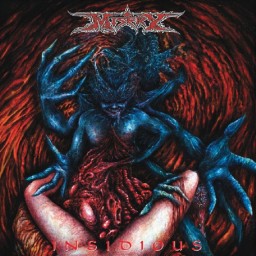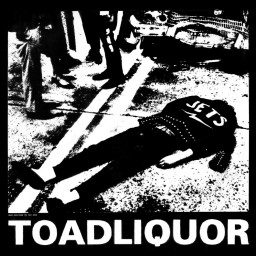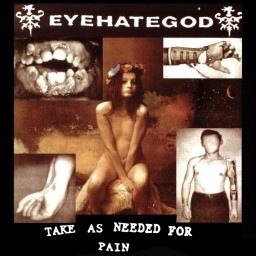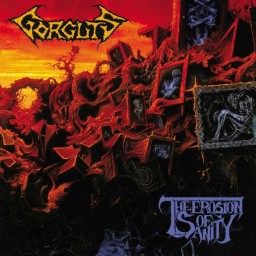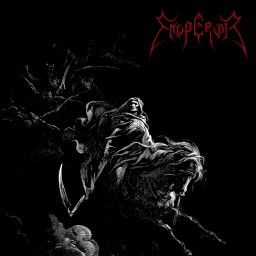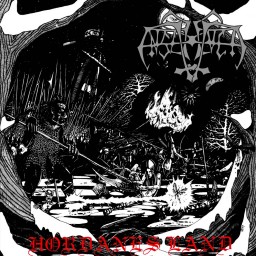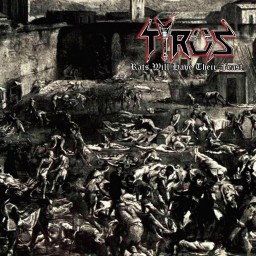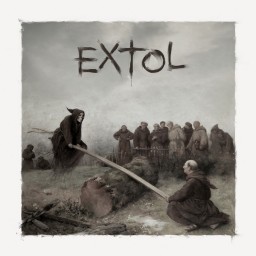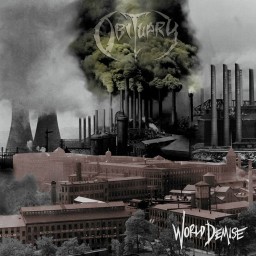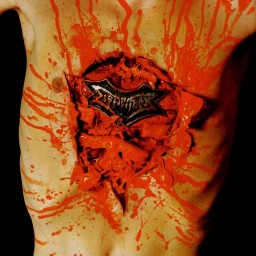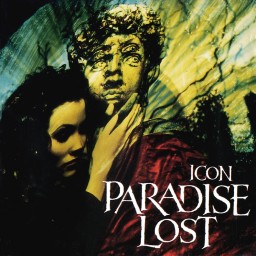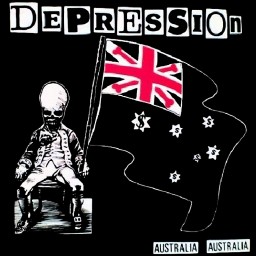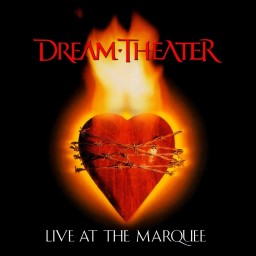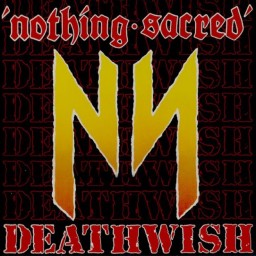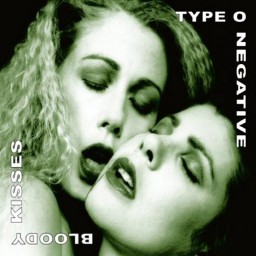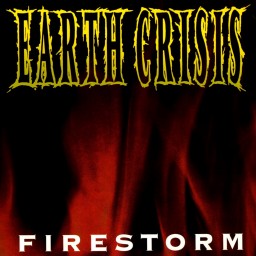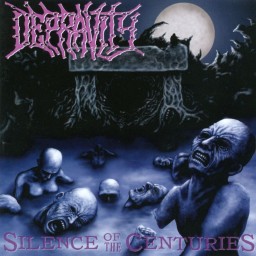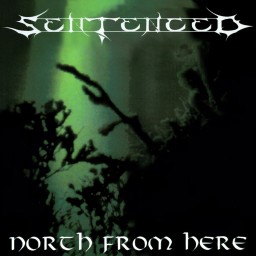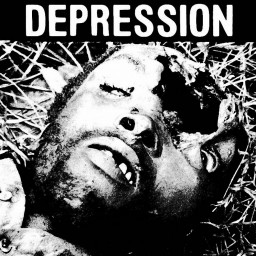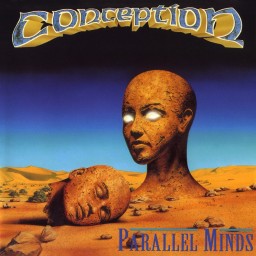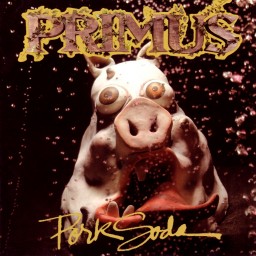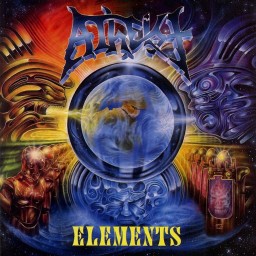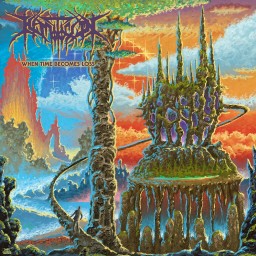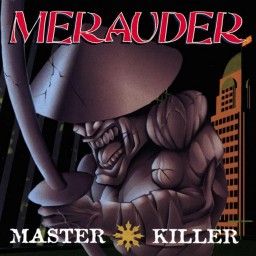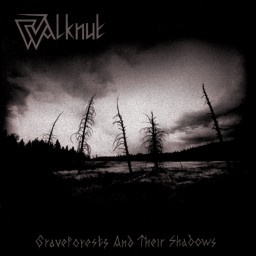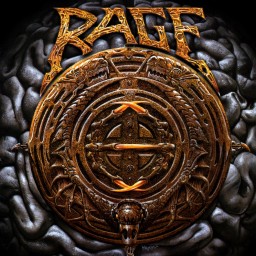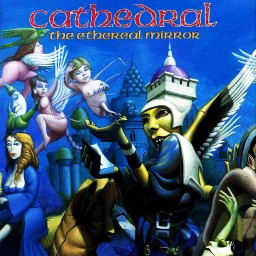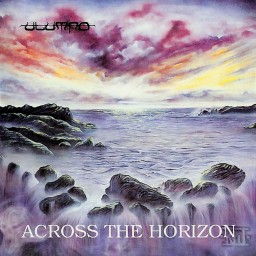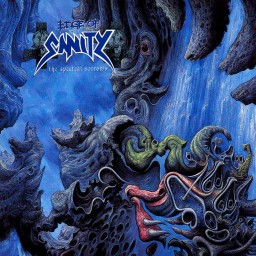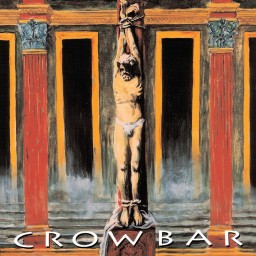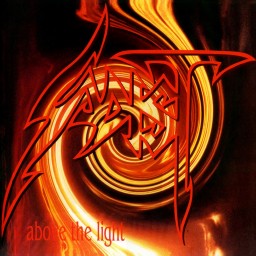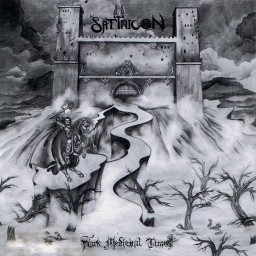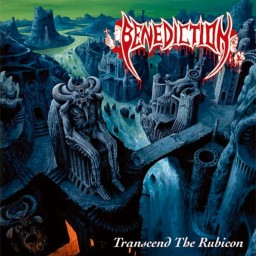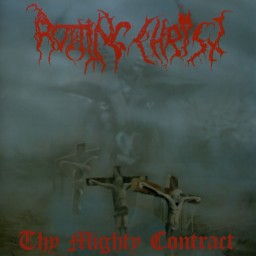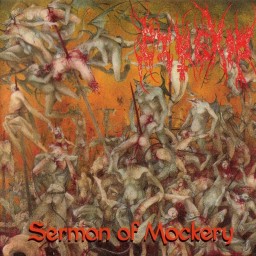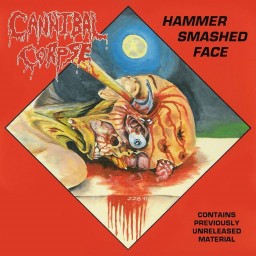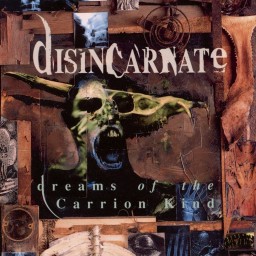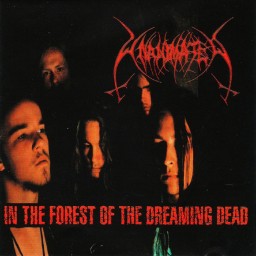Daniel's Reviews
I recently spent some time revisiting the 1993 “A Necessary Evil” debut album from Aussie death metallers Misery & it wasted no time in reminding me as to why it was such an influential & motivational release for myself & my Neuropath band mates back at the time of release. That record went a long way to proving that a local band could compete with the rest of the world & was a very solid example of the early 90’s death metal sound that saw me immediately counting myself as an enthusiastic fan of the Brisbane five-piece. So, when Misery released their second proper release in 1994’s “Insidious” E.P. I found myself leaping in with both feet & with the expectation of another highly professional & invariably entertaining death metal experience, a hope that was fulfilled in generous measure by the four songs it contained.
“Insidious” sports a very impressive production job for a local death metal release, once again having been recorded at Red Zeds in Brisbane. It saw Misery returning with a slightly altered lineup to the one that had impressed me so much with “A Necessary Evil”. Original front man Darren Goulding (Manticore) had departed & been replaced by the relatively unknown Moises Contreras, a move that concerned me given that I very much enjoyed Goulding’s contribution to the debut. I need not have worried too much though because Contreras makes a great fist of his opportunity here. In fact, I probably wouldn’t have known there’d been any lineup change at all to honest because he takes a very similar approach to his predecessor with his imposing growl being one of the highlights of the release. The other major talking point for the E.P. can be found in Misery’s trademark pacing which sees them staying predominantly in the slow-to-mid tempo range but showcasing a wonderful understanding of dynamics & structure to create tension. The listener rarely feels that they’re being battered into submission. It’s more a feeling of being engulfed as dark, cavernous walls slowly close in on you. I really enjoy that experience & feel that it showcases the musical maturity of these young dudes really well. The use of pitch-shifting effects on the lead guitar work & subtle keyboards to add some additional atmosphere are further examples of that & are universally successful in their undertaking, as are the professionally executed intros & outros which work to further accentuate the eerie, unnerving backdrop the band were crafting with their song-writing.
The four songs included are all well worth hearing in what is another very consistent release from a band that seemed far too professional to produce anything sub-par at this point in their musical journey. The clear highlight for me is the wonderful “Torn” which I regard as being Misery’s finest work to the time & was subsequently made into a video that’s gone on to become somewhat of a cult classic. The opening stanza of “Torn” sees Misery’s sound taking on it’s most compelling form with all of the things the band have become known for combining to give me chills down my spine. The start of opening track “Seeds of Doubt” achieved similar levels of dark death metal glory to be honest but the rest of the song couldn’t quite maintain them, seeing it finishing as a solid inclusion more than an elite level example of the genre. Closer “Innocent Torture” is also very strong but I do feel that “Venganza del” sees the quality level dropping just a touch from the rest of the material, even if I do still enjoy it quite a bit.
“Insidious” shows clear evidence that Misery had been paying attention to what was going on around them in the global death metal scene as it saw them building on their early success with a slightly more polished & professional sound that continued to impress the underground. While I really enjoyed “A Necessary Evil”, I feel that “Insidious” is slightly stronger again, potentially off the back of “Torn” which was the genuine highlight that the debut had been missing. Contreras would make his exit from the Misery story at this point, never to be heard from again as far as I’m aware, but Misery would continue to make high quality death metal for some time yet. In fact, I believe they are still playing shows today after recently reforming & that can’t be a bad thing as far as I’m concerned. I may not be quite the fan boy I was back in the day but I can still appreciate well-made death metal when I hear it & this is certainly a fine example of that.
For fans of Innsmouth, Abramelin & Psychrist.
Genres: Death Metal
Format: EP
Year: 1994
I'd not heard much about Californian five-piece Toadliquor before now. They've kind of existed on their own underground plane for the last few decades, always steering well clear of the mass popularity contest that is the commercial metal scene in the United States. Hell, they've always flatly refused to release their most popular record (i.e. this one) on CD, instead choosing to offer it up on vinyl only which should tell you a little bit about the band themselves who have largely remained fairly anonymous with none of the five members being associated with other acts. But people seem to have picked up on Toadliquor fairly organically over the years & we now see their 1993 debut album "Feel My Hate - The Power Is the Weight - R.I.P. Cain" being held up as a minor classic in some parts of the more well-informed metal demographic. As you all well & truly know by now, I need to know why in these cases so this week I've decided to explore Toadliquor for the very first time to see what the hell all the buzz is about. I'm glad I did too because it's a very rewarding record indeed.
"Feel My Hate - The Power Is the Weight - R.I.P. Cain" is a 42-minute album that includes seven songs with all of them being well & truly worth your time. It's an unapologetically sludge metal record too it has to be said. Other websites like Metal Archives & RateYourMusic will always award releases like this one a dual tag with doom metal but, in reality, there's really no need to if you have any idea as to what the sludge genre is all about it because it inherently implies the inclusion of doom tempos & riffs. As with a lot of good doom metal though, there's no necessity for Toadliquor to reinvent any wheels as far as their sound goes because good doom riffs are timeless & Toadliquor are too in many respects because this album could just as easily have been released today as 31 years ago. There are loads of bands that sound like this but very few deliver their product with this level of conviction. It's interesting that some RYMers are tending to reach for drone metal secondaries for this release though. Just where they're finding those associations is beyond me as I simply don't see it.
I wouldn't say that Toadliquor's sound is quite as dark, drug-fueled & desolate as an Eyehategod whose highly regarded sophomore album I reviewed only yesterday but I would suggest that it's slightly more consistent in its overall heaviness & I tend to favour it over "Take as Needed for Pain" for that reason, particularly given that it doesn't revert to groovier stoner metal riffs like Eyehategod have a tendency to do. The most significant & divisive element of their sound though is quite clearly the vocals of front man Rex whose delivery comes in the form of a tortured howl more than a masculine hardcore grunt or psychotic scream. I have to say that I do struggle with him a little bit at times & I can't deny that his inclusion has limited just how high my rating has the potential to go because I can't deny that Toadliquor would have been much better served with a more traditional sludge metal vocalist. Perhaps they wouldn't have been able to separate themselves from the huge swarming mass of American sludge bands if they had of gone that way though as Rex is certainly the main talking point when discussing the album. I just wish he didn't sound as phoned-in as he does at times because the effort doesn't always seem to be there.
The tracklisting is brilliantly consistent with the instrumentalists all having a fantastic understanding of the sludge metal medium & of dynamics in general. It's really very hard to pick out highlights as every song has excellent instrumentation with Rex's contribution tending to hold me back from being able to claim many of them as genuine classics. I do think that the crushingly immense heaviness of "Fratricide: A Requiem" manages to overcome those limitations & I can see it going on to become a genre favourite for me in the future. Outside of that, I'd probably suggest that the two tracks that precede it in "Gnaw" & & "Charred" make for an excellent trio that represent somewhat of a sweet spot for the album overall. The rest of the record isn't much different though & if you like one Toadliquor song then you'll no doubt dig everything they bludgeon you with here. Be warned though, this record isn't for the faint-hearted or the casual sludge listener. It's a wall-to-wall sludge-a-thon.
"Feel My Hate - The Power Is the Weight - R.I.P. Cain" was a very easy one to come up with a rating for really. I clearly couldn't afford it an elite score as Rex's vocals simply don't leave that as an available option but, at the same time, the instrumentation is so well written & executed that it was never going to score less than four stars either. I feel that I can easily see a) why Toadliquor as so highly regarded in underground circles & b) why they've never managed to break out of those circles for more mainstream appeal. They're very much a sludge band for sludge fanatics only &, thankfully, I just happen to be one of those so this has been a very worthwhile experience that I'd recommend to others who fall into that category.
For fans of Meth Drinker, Nightstick & Grief.
Genres: Doom Metal Sludge Metal
Format: Album
Year: 1993
It's been just over two years since I finally decided to take the plunge with New Orleans sludge metal phenomenon Eyehategod through their very solid 1996 third album "Dopesick". I found that I really enjoyed their drug-fueled, desolation-inducing brand of sludge at the time & wondered why it'd taken me so long to get them given their stature in the scene, even if some of the more groovy stoner inspired moments weren't particularly to my taste. I subsequently added Eyehategod's other supposed classic in 1993's "Take as Needed for Pain" to my to-do list but it's probably more of a reflection of just how greedy I am for quality metal to find that it's taken me this long for that investigation to actually come to fruition. I'm glad it has though as the effort was certainly paid off.
After reading my review of "Dopesick", I've almost decided that there's no need to review "Take as Needed for Pain" given just how similarly I feel about it. In fact, that review perfectly describes what I've been thinking of writing for this one so I'd suggest that "Dopesick" was very much "Take as Needed for Pain Part II". There's nothing particularly fresh or new about Eyehategod's second full-length either though. It's simply a highly effective sneak-peak into the mind of a down & out drug addict, living in redneck America with a level of pent-up anger that would seem ready to explode into violence at any moment. What we have here is some crushingly heavy sludge metal riffs of pure doom, taking the occasional groovy stoner metal direction to break up the misery, & with a super-pissed & vicious front man who does his very best to make sure that your attention doesn't deviate from the horrifying human car crash he's describing in great detail.
As expected, I'm nowhere near as big a fan of the stoner parts as I am the remainder of the album but I can accept that this element is a part of Eyehategod's identity & move on to the more attractive (yet equally repulsive) darker shit, even if my scoring has been capped a little as I don't think I could consider my more elite ratings for a record like this one where none of the twelve tracks reach classic status for me. There are a couple of moments across the fifty minute run time where the album temporarily loses my interest too with the more stoner-inspired "Sister Fucker (Part I)" not being to my taste & closing tape music interlude "Laugh It Off" being pretty much a waste of space. It's hard to pick out the highlight tracks from this lot as the stronger moments tend to have a lot in common with each other but, if pushed, I'd probably mention songs like opener "Blank" (my personal favourite), "Shop Lift" & the bravely-titled "White Nigger". There's a clear correlation between the increase in stoner & my scoring dropping off a touch though which I could have told you would be a problem.
It's really very hard to pick a winner between Eyehategod's two most widely celebrated album "Take as Needed for Pain" & "Dopesick" as there's nothing between them as far as I can see. Perhaps the fact that I've now spent a fair bit of time with "Dopesick" is seeing me just leaning towards it by the slightest of margins but if you enjoy one then you'll no doubt really dig the other too. Is this the pinnacle of the sludge movement? Nah... I don't think so personally but I'll be damned if it's not a worthwhile exercise in general discomfort & depravity though. As will all good sludge metal, the world that Eyehategod depict isn't a pleasant one but there's a twisted part of my brain that craves this sort of misery. Perhaps my wife is right & I've simply taken too many drugs in my life. Personally, I'd suggest that I haven't taken enough of the good ones but that's just me. Regardless, all druggy sludge metal devotees will likely want to ensure that they acquaint themselves with "Take as Needed for Pain" as it's a high-quality & undeniably important release for the genre.
For fans of Acid Bath, Iron Monkey & Crowbar.
Genres: Sludge Metal
Format: Album
Year: 1993
Warning! Warning! Fucking monster influence alert! Immense masses of fanboyism will likely ensue in the paragraphs that follow ladies & gentlemen! You see, I was already a big fan of Canada's Gorguts when their 1993 sophomore album "The Erosion of Sanity" landed on the shelves. I'd purchased their 1991 debut "Considered Dead" on CD a year or two earlier & it had left me thoroughly impressed, perhaps not with the originality in Gorguts' sound as that release wasn't exactly groundbreaking however its execution was top notch & it showcased an outstanding pedigree in classic death metal. By 1993 though, I'd become obsessed with the more brutal end of the genre & had also developed a fascination with the more technically proficient bands in the scene so it came as a wonderful surprise to hear my brand-new copy of Gorguts second full-length upping the ante in both departments. "The Erosion of Sanity" would go on to play a major role in the direction of my own band Neuropath over the next few years so it's always maintained a special place in my heart. This week I decided to give it a more critical investigation than I'd ever done before in order to see where it rightfully should sit in the star-studded Gorguts back-catalogue.
While "Considered Dead" was extremely proficient at what it attempted & delivered a very solid meat-&-potatoes brand of death metal, I don't think I ever thought of it as any sort of classic as it simply came a little too late in the game for that with the bands & records it was trying to emulate already having produced the elite releases for its old-school death metal sound & occasionally even doing it better too. "The Erosion of Sanity" saw Gorguts taking a new direction though. The early Death influence that dominated "Considered Dead" had been replaced by a more modern & sophisticated compositional approach that was much closer to Death's "Human" than it was Chuck Schuldiner's earlier works while the riff structures had been boosted by a significant amount of complexity & technicality, not to mention having been beefed up by the influence of brutal death metal pioneers Suffocation whose debut album "Effigy of the Forgotten" had clearly been in high rotation in the Gorguts rehearsal studio. This time the band had opted not to record at Florida's legendary Morrisound Studios with its equally notorious producer Scott Burns, instead staying home in Quebec where they worked with Englishman Steve Harris (no, not that one) who had previously worked with extreme metal bands like Acid Reign, Lawnmower Deth, Fear Factory & Bolt Thrower which has resulted in a seriously chunky & quite dense production job that perfectly highlights Gorguts' strengths, even if it can leave things sounding a little samey if you're not paying close attention.
Gorguts' had maintained the same lineup that produced "Considered Dead" which certainly helped their cause but, as we now know, it's always been guitarist Luc Lemay's (Negativa) project & his vocals are a major highlight on "The Erosion of Sanity", with his raspy growl rearing up into monstrous territory quite regualarly. Lemay provides the song-writing with the touch of added savagery that was needed to give Gorguts more of an edge & it works very well over the more ambitious instrumentation which sees the album easily managing to differentiate itself from its more than acceptable older sibling. The musicianship on display is nothing short of dazzling at times & I particularly enjoy the bass performance of Eric Giguere who shows himself to be leaps & bounds ahead of most of his contemporaries, buoyed by a nice mix that helps to isolate his basslines from the controlled chaos that surrounds them. There's a spider-fingered feel to the way Gorguts have constructed many of the riffs that leaves me with no doubt whatsoever of the influence of Suffocation, only these lads opt to deliver their assault with more subtlety, if not much more in the way of dynamics.
The tracklisting is particularly consistent with all eight songs showing themselves to offer plenty on the way of thick, heavily palm-muted yet still highly technical death metal riffage. The A side is completely without blemish & leaves the listener with little option but to claim Gorguts as a new member of the tier one death metal players. There are a couple of tracks included on the B side that aren't quite at that level (see "Hideous Infirmity" & closer "Dormant Misery") but the other six songs are simply ooze of class & a feel that's undeniably classic. If I was forced to pick favourites I'd have to go for the first three songs with the title track being perhaps my pick of the bunch.
The Gorguts back catalogue sits amongst the strongest in all of death metal in my opinon so "The Erosion of Sanity" was always gonna have stiff competition in that regard but I'm thrilled to have discovered that it's lost none of its charm over the three decades since I first purchased my CD. Sadly, I'd suggest that it's no longer my absolute favourite Gorguts record though. I think that honour would now have to go to 2013's magnificent comeback album "Colored Sands" while I'd also suggest that I'd place 2001's "From Wisdom to Hate" release slightly ahead of "The Erosion of Sanity" these days. That's not to say that this is not still a classic technical death metal record though & one of the rare tech death releases that has a legitimate claim to the tag too, rather than simply being a mistagged progressive death metal record. After the experience of this weeks revisit, I have no hesitation in claiming that every The Horde member worth their zombie film collection should treat "The Erosion of Sanity" as essential listening.
For fans of Death, Suffocation & Cryptopsy.
Genres: Death Metal
Format: Album
Year: 1993
As with Enslaved's "Hordanes Land" E.P. that I reviewed only yesterday, the first proper release from Norwegian symphonic black metal gods Emperor would represent my earliest encounter with them & would come off the back of my having purchased the split CD that included both releases some time towards the end of 1993. You may recall me mentioning that I owned an original copy of Emperor's "Wrath of the Tyrant" demo tape from 1992 but that purchase wouldn't come about until 1994 & was off the back of my having gained a great deal of enjoyment out of the "Emperor" E.P. first. I can still recall my first impressions of Emperor whose sound differed from the rest of the Norwegian scene in several ways, at least it did by the time this E.P. was recorded as you can already hear elements of the symphonic black metal sound they'd pioneer creeping into their sonic arsenal here as well as hints at their later progressive tendencies. I remember being struck by just how classically-inspired their compositional work seemed & how they managed to use melody so well i.e. without losing the inherent darkness that was required for good black metal to work. There was no doubt a romantic element to it that borrowed from the great gothic art of the ages too. It's time to reassess the E.P. with fresh ears now though. Let's see if it's stood up to the test of time.
The "Emperor" E.P. contains just the four tracks & spans just over twenty minutes in duration. I've always loved the cover artwork which went a long way to seeing me purchase the Emperor/Enslaved split CD to begin with to be honest. It's so simple yet so effective as the blood red logo stands out boldly against the black & white imagery which is nothing short of spooky & represents the majesty of the music contains very well. The band entered Studio S to record the E.P. in December 1992 & I believe this may have been their first time in a studio as the "Wrath of the Tyrant" demo was a home 4-track recording as far as I'm aware. It's interesting that Emperor elected to produce the record themselves then actually but perhaps they couldn't afford to engage a proper producer at the time. The result of those sessions sounds stereotypically Norwegian though which may or may not have been intentional. They achieved that classic higher register guitar tone with all of the bass & mid-range frequencies having been removed, although I do have to admit that I would have liked the guitars to have been higher in the mix. The vocals are also quite low in the mix which would become something of a trademark for Emperor & for a lot of black metal in general as it allows them to appear more otherworldly, almost like they're the cries some sort of demonic entity from the very bowels of Hell itself. The bass & drums are more up-front while the keyboards play a prominent role which would become the key to Emperor's identity over the next few years. In fact, while it may be easy to criticize the fact that the guitars sit a little behind the keyboards & allow them to play the role of the protagonist, it's also worth noting the influence that this had on black metal in general with a huge array of bands appearing who used the guitars in more of a textural way while the symphonics played the starring role.
Emperor's lineup had changed a little from the "Wrath of the Tyrant" demo tape. Samoth (Scum/The Wretched End/Arcturus/Gorgoroth/Satyricon/Thou Shalt Suffer/Zyklon/Zyklon-B) had swapped instruments from drums to guitar which was a positive move as he was hardly a superstar behind the kit & it allowed the band to recruit a more talented performer in the infamous Faust (Blood Tsunami/Djevel/Aborym/Thorns) who would stay with Emperor until his arrest for murder a few months after the release of the EP. By that stage he'd already had the chance to record the stunning "In The Nightside Eclipse" album which would ensure his place in extreme metal folklore. While indulging in the sophistication & creativity of this release it's fairly easy to forget that Emperor were just a bunch of 17 & 18 year olds at the time it was recorded. Just let that sink in for a minute because it's pretty amazing when you take into account the groundbreaking sound they'd created. Love it or hate it, Emperor's sound, even at this early stage, sounds like no one else that came before them & set the tone for an entire strand of the black metal movement that would never manage to equal them in all the years since. Less surprising perhaps is the wide-reaching impact that the various members have had on the international metal scene, particularly front man Ihsahn (Thou Shalt Suffer/Hardingrock/Peccatum/Zyklon-B) who was the clear band leader & mastermind behind Emperor from an extraordinarily young age (note: he was just 17 years old here). Even bassist Mortiis (Cîntecele Diavolui/Fata Morgana/Vond) has gone on to become somewhat of a genre leader for his electronic work under several different guises.
The tracklisting on "Emperor" is generally very solid. "Night of the Graveless Souls" & "Wrath of the Tyrant", that originally appeared on the demo tape, have been revisited here, the former offering a similar level of appeal to the original but the latter sounding significantly improved & possibly representing my favourite cut on the release. The two new songs would both be re-recorded for the classic "In The Nightside Eclipse" debut album only months after this recording & are noticeably more symphonic & expansive with the creativity having been taken to another level. "I Am The Black Wizards" has gone on to become arguably the band's calling card & is probably my favourite track from the album. Here it's a little more restrained & suffers from the wishy washy production job in comparison to the album version with its huge wall of sound. Ihsahn's vocals drift in & out of focus a bit here & I think his delivery would be improved for the album too but this is still a fantastic black metal tune. "Cosmic Keys to My Creations & Times" is an incredibly ambitious piece of work for 1993 too with a number of more progressive passages presented throughout its run time, a concept that Emperor would expand on much more thoroughly in the years to come. The use of keyboards is clearly becoming more prominent with each new song. Personally, I prefer the more straight-forward "Wrath of the Tyrant" (the song, not the release) in this format but things would change once Emperor had received the immense, overblown production job they deserved on "In The Nightside Eclipse". "Night of the Graveless Souls" is the weaker of the four songs quite clearly as it suffers from a bit of cheese in the violin flourishes it attempts but I still quite like it.
Looking back now, I can't say that I regard "Emperor" as an elite black metal release & I didn't do at the time either but there can be no denying its importance to what was to come, not just to the black metal scene but also to me personally as a young fella. Despite it being entirely appropriate for the record itself, I do feel like the production job lets Emperor down a bit here as the material isn't as in-your-face as it should probably have been but it's easy to say that in retrospect now that we're so accustomed to the greater potential some of the songs were afforded on "In The Nightside Eclipse". Unlike Enslaved's "Hordanes Land" with its utterly spectacular opening track, I don't think that any of the four pieces included here have managed to reach classic status for me though which has surprised me a little. For that reason, I do tend to place "Emperor" slightly behind "Hordanes Land" which is in direct contrast to most people I've spoken to about it over the years. Emperor would very quickly surpass their fellow Norwegians with their next release though & it would subsequently see me holding them aloft as the absolute pinnacle of the subgenre they'd created, even a full three decades later. Hell, I was only forced to throw away my "In The Nightside Eclipse" long-sleeve recently after it had developed so many holes that I was embarrassed to wear it any more & I experienced physical pain while separating with it. It's needless to say that "Emperor" should be in every black metal fan's collection because it's simply assumed knowledge at this point.
For fans of Enslaved, Abigor & Satyricon.
Genres: Black Metal
Format: EP
Year: 1993
The Norwegian Second Wave of Black Metal hit my teenage life like a tonne of bricks back in 1992. I'd already been a fan of First Wave black metal bands like Bathory, Hellhammer & Sarcofago for some time by that stage but the likes of Darkthrone & Burzum took my fascination with the dark majesty of this sound to an all-new level that compared favourably with my metal genre of choice at time i.e. death metal. I'd soon find myself seeking out the more underground material the black metal scene had to offer & in large quantities too, locking myself away in a completely blackened bedroom with my headphones on while fantasizing about life in an icy forest of trolls. This would be the time that I'd discover the now legendary Enslaved after I picked up their split CD with fellow Norwegian superstars Emperor in late 1993, a release that only increased my appetite for this style of music. Before long I would find myself seeking out Enslaved's early demo recordings in order to further quench my thirst but it would be the "Hordanes Land" E.P. that represented the band's coming of age as artists & would signal the start of their rise to the top of the black metal ranks. I've revisited it many times over the years but this will be the first time I've attempted to rate or review this release which I know so well after all this time.
The "Hordanes Land" E.P. is a three-song affair that spans just over half an hour with each track being of significant length. It was recorded during September & October of 1992 at Lydloftet, Ølen with the assistance of a trio of producers in Reinhardt Toresen, K. B. Bjørkhaug & K. Ulland, none of which had made a name for themselves prior to this release. The result of those sessions is instantly recognizable as the classic Norwegian black metal sound though & it puts Enslaved in the discussion as far as the earlier protagonists of the Norwegian movement. Enslaved's lineup was only a trio at the time but the three pieces they'd produce were all very ambitious & expansive for a group of young musicians, none of them having reached their nineteenth birthday at the time with guitarist Ivar Bjørnson (Ivar Bjørnson & Einar Selvik/Borknagar/Mysticum/Trinacria) amazingly being just fourteen when "Hordanes Land" was recorded. The title of the E.P., which is taken from the old Norwegian language, can be translated as "Land of the Hordes" & is a very good depiction of the adventure & majesty that can be found within.
The early Enslaved sound in much less progressive than the one they'd go on to create in later years but was still highly sophisticated for the early black metal movement with the song structures all taking a number of turns in a variety of different directions. There are a few drastic changes that can feel a little jerky at times but it's not a major issue. The epic thirteen-minute opening track "Slaget i skogen bortenfor" is by far the most significant of the three inclusions & was comfortably my favourite song on the split CD with Emperor that received such regular play time with me as a late teenager. In fact, it's the reason that I've always held the Enslaved side of that split CD in slightly higher regard than the Emperor one, despite it being of a similar quality in many respects. I adore the blasting drums of Trym (Emperor/Zyklon) & their combination with bassist Grutle Kjellson's tortured shrieks & Bjørnson's wonderful use of keyboards was highly influential at the time. It's also a feature of the split release with Emperor employing a similar approach on their self-titled. The use of acoustic guitars gives this track an organic feel that simply oozes of the cold Norwegian landscape of snow-covered forests & leaves an accurate depiction of just how influential Enslaved were on how the Second Wave sound developed over the coming years. It's not a huge stretch to be able to predict the more progressive leanings that Enslaved would take with their sound in the future given just how ambitious this early material was for such an immature trio of kids. The other two pieces are a touch less expansive but are still as overt in their creativity. The second track "Allfǫðr Oðinn" appeared on Enslaved's 1992 "Yggdrasill" demo tape where I quite liked it but here we see it being taken to another level. The early part of the song sounds noticeably less sophisticated & epic than "Slaget i skogen bortenfor" but at the two-minute mark the band hit on a classic Norwegian tremolo-picked melodic guitar theme that takes things into the stratosphere &, in doing so, predicts so many of the great black metal that was to come over the remainder of the decade. The song-writing is a little patchy but this theme alone plays such a significant role in the way the song plays out that it single-handedly manages to drag "Allfǫðr Oðinn" into very solid territory. The ten-minute closer "Balfǫr" is comfortably the weaker of the three inclusions in my opinion although I do still enjoy it. The use of keyboards is a little cheesier on this one & it's a little more melodic & a touch less dark than the other two pieces too although the use of acoustic guitar is very effective & things ramp up significantly when Trym gets his blast beats on.
Perhaps "Hordanes Land" doesn't represent the peak of Enslaved's creative journey but it was still very much their coming of age as artists & is especially impressive when you consider the relative immaturity of the three musicians involved. I'm particularly amazed at the scope of musicality that's been drawn out of Bjørnson here as his contribution often sounds incredibly mature for a child of just fourteen years old. It's really no wonder that we'd see him pushing Enslaved into my progressive territories in the future as he still had a whole world of musical exploration ahead of him. It's interesting to ponder on how he came to have such a strong understanding of the black metal ethos at such a young age too. I'd imagine that he must have had some older & fairly well-informed influences around him during the previous few years. Enslaved would return with their debut album "Vikingligr veldi" the following year, a release that I still regard as their finest black metal work to this day, but "Hordanes Land" really wasn't all that far behind when you look at it in the modern day. I'm not sure that I've ever regarded Enslaved as a tier one black metal producer but this is a damn fine first-up effort nonetheless & should be an essential inclusion in any black metal fans collection.
For fans of Helheim, Emperor & early Borknagar.
Genres: Black Metal
Format: EP
Year: 1993
Short-lived Melbourne thrash metal outfit Tyrus may never have recorded a proper album with their entire discography amounting to just a couple of short & obscure demoes but they still managed to cement their place in Australian metal folklore, mainly due to the role they played in the creation of the local thrash scene but also because of their association with other early Melbourne metal bands like Hobbs Angel of Death, Fair Warning, Depression & Mass Confusion who they shared members with. When I first took my first tentative steps out into the Sydney extreme metal scene in the very early 1990's, I would quickly find that there was an underground subculture that held aloft widely unknown artists (many from other states) as dark overlords of our chosen field & Tyrus would be mentioned in whispers as one of the founding fathers. In the years that followed I would repeatedly hear those lone Tyrus recordings at drunken after-parties at older metalheads homes so they would them become very much ingrained in my youth, perhaps more than they ever had a right to from a quality perspective. It's been many years since I've revisited them now but the discovery of this compilation of all of Tyrus' studio recordings has lured me in to see how they've held up an incredible 38 years later.
"Rats Will Have Their Feast" draws together the four songs from the self-titled 1986 Tyrus demo tape & the title track from the "Liar" single from the same year in a short nineteen-minute recap of the band's short three-year career. These appeared very early on the Aussie extreme metal story & I'd argue that if Depression's 1985 crossover thrash effort "Australia, Australia" E.P. is the very first Australian thrash metal release then the "Tyrus" demo tape may well be the first conventional thrash one although that's open for debate as there are other seminal recordings from 1986 floating around & it's impossible to know exactly when each hit the streets. Personally, I've always thought of the 1986 demo tape from Sydney's Massive Appendage as ground zero for Aussie thrash metal as we know it dropped in March 1986 but there were other players like Tyrus, Slaughter Lord & Non Compos Mentis whose demo recordings from that year may well have been released earlier. It's just a little hard to say.
The sound quality of the two recordings differs greatly with the demo tape sounding vastly superior. In fact, the demo sports a really good production job for a demo from the time actually with all of the instruments being presented in complete clarity & being well balanced. "Liar", on the other hand, sounds a lot softer & a touch flat in comparison with the guitars being slightly muted & further back in the mix. Tyrus' riff construction is super-basic for thrash & one gets the feeling that band leader Peter Hobbs (Hobbs Angel of Death) had essentially borrowed them from the "Baby's First Thrash Riff" children's hardcover. There's something about the songwriting that gives these simple mosh pit tunes some added weight though, in much the same way as the great Celtic Frost material managed to overcome a similar trait. The performances are very tight & well integrated which certainly helps with plenty of space left in the songs thanks to an element of restraint having been taken with the arrangements. This is naive, youthful metal music for people that live & die by the genre & I just happen to be one of them which helps greatly in the appeal of a release like this one which seems to take the speed metal-infused sound of the earliest thrash records like Metallica's "Kill 'Em All" & Slayer's "Show No Mercy" & blends it with the influence of the classic Venom material.
The material drawn from the "Tyrus" demo is of a very similar standard with all four songs being enjoyable. There's a fair bit of variety in tempo across the tracklisting which keeps things interesting with even the slower numbers like "Crucifixion" & "Shrine of Satan" maintaining a solid footing in thrash thanks to their dark feel & evil lyrical themes. Hobbs sounds quite angry here, much more so than on "Liar" where you can be forgiven for thinking it's a completely different person because he sounds nothing alike, & you can very easily detect the impact of Venom's Cronos on his approach. Opening track "Bubonic Plague" reminds me heavily of Slayer's "The Final Command" & I don't think that's a coincidence although the guitar solo section may well have been lifted straight off of "Kill 'Em All". The speed metal influence is very noticeable on "Liar" & I get the feeling that it may have been recorded prior to the demo but it's hard to say for sure. It's certainly not as successful as the demo material & is the clear weak point of the release. "Cold Steel Warm Death" possesses a similar speed metal backbone & (along with "Shrine of Satan") sounds a little more raw & abrasive than the first two songs taken from the cassette thanks to some variation in the production between tracks.
While "Rats Will Have Their Feast" may not make for essential listening for the average international thrasher, it does offer a rare insight into the earliest attempts at emulating the thrash metal sound that had taken the world by storm a few years earlier. The fact that it took that long is really a testament to just how isolated Australia was from the rest of the world in a pre-internet era. These recordings will always hold strong nostalgic appeal for someone like myself who spent many late nights & early mornings raising their drunken metal claws to the sky to this material but it's actually held up pretty well by modern day standards too thanks to some pretty decent songwriting & a reasonably good sound quality so you could do a lot worse than to check it out.
For fans of Rampage, Renegade & Hobbs Angel of Death.
Genres: Thrash Metal
Format: EP
Year: 2012
I came to Norway's Extol fairly late in the game to be honest. By the time they first hit the underground in the late 1990's I was already heading for the exit door as far as metal music went & I wouldn't find myself returning to the scene until around 2009 which is when I first heard their 2000 sophomore album "Undeceived". It left quite an impression on me & received a lot of replays over the coming years & that experience would lead me to head back & explore Extol's 1998 debut album "Burial" & 1999 "Mesmerized" E.P., as well as to look forward to their 2003 "Synergy" third album which is the topic of discussion today. I don't recall revisiting "Synergy" over the many years since as it's generally been "Undeceived" that I reach for when I've looked for an Extol fix but Ben's introduction of the band's 2005 fourth album "The Blueprint Dives" to me a couple of years ago revitalized my interest in the band. I hadn't checked out that album before & it really hit the spot for me, despite it seeing Extol finally breaking free of the chains that tied them to their early extreme metal roots. It's been quite a while since I crossed paths with "Synergy" now, around fifteen years to be exact, but I held vague memories of it being a pretty decent release so this month's The Pit feature release nomination was most welcome.
Wow! "Synergy" jumps straight out of the gates with amazing complexity. It's one SERIOUSLY technical record performed by some incredibly ambitious & undeniably talented musicians. Extol's death metal roots had been completely cast aside by this stage in their evolution with the general consensus being that "Synergy" is a progressive tech thrash record. Look, there are certainly some thrash influences on display (i.e. Coroner, Believer, etc.) with three or four of the songs containing enough of a thrash component to justify the tag but the record is much better suited to a lone progressive metal tag when taken holistically as its scope is far more wide-reaching than the thrash metal genre allows for. The vocals of front man Peter Espevoll are quite raspy & a touch blackened, sitting somewhere between Meshuggah's Jens Kidman & a black metal shriek most of the time which is well suited to the occasional forays into tremolo-picked black metal territory. The links to Christianity are unfortunate but, in truth, they play very little role in the way the album plays out if you don't actively seek out the lyrics. The guitar solos of Christer Espevoll (Azusa/Benea Reach) & Ole Børud (Fleshkiller/Schaliach) are a real highlight & show both of them to be well on top of their chosen craft with a high level of sophistication displayed in the way they construct their leads. I can only imagine it must have taken drummer David Husvik (Azusa) a very long time to learn this material as it's heavily weighted towards unusual time signatures & polyrhythms. He does a splendid job of it though if you ask me.
The tracklisting on "Synergy" is very consistent with no weak songs being included to tarnish the overall impression left by the album. The high level of complexity does make it challenging for any of the numbers to really stand out from the rest as genuine classics but the struggle to balance out technical wizardry with ear-catching hooks is not isolated to Extol. It's been a perennial issue for ultra-progressive bands like this one over the years & if there's one area that Extol probably needed to improve a touch then that's it. Thankfully, we'd see them do a better job at it with 2005's "The Blueprint Dives" album which did contain a couple of true gems. If I had to pick favourites amongst this lot then I'd have to go with opener "Grace for Succession", "26 Miles From Marathon" &, my pick of the bunch, the thrashy "Paradigms". The quality does dip just a touch towards the end of the album with both the folk pop piece "Aperture" & thrashy closer "Nihilism 2002" being more acceptable than they are impressive but it's hard to complain as neither are exactly filler either. You get the feeling that Extol were likely beyond producing filler at this point in their careers given the strong grip that each member has on their chops & musical vision. Peter Espevoll's vocals can sound a touch one-dimensional at times & one gets the feeling that a more interesting clean singer may have been able to take the album to the next level.
I'm pleased to advise that "Synergy" is another high-quality & quite challenging release from an excellent metal band that sits very comfortably just behind "The Blueprint Dives" as an holistic package. It's actually surprised me a bit as I hadn't given it quite as much credit when I first encountered it back in the day. Perhaps it's not the most appropriate selection for a The Pit feature release given that it seems to be more closely affiliated with The Infinite but it's certainly exciting enough to encourage the thrashers out there when it hits on some of its higher tempos.
For fans of Believer, Azusa & Lengsel.
Genres: Progressive Metal Thrash Metal
Format: Album
Year: 2003
Florida death metallers Obituary played an extremely important role in my teenage years. The late 1980's had seen me very quickly being transformed from a pimple-faced hard rock & heavy metal kid into a fully-fledged thrash nut off the back of the Big Four but it wouldn't be long before the lure of the darker & more intense death metal world would start to progressively increase the tension on the chord it had attached to the back of my pants when I first heard Death's "Leprosy" album. Some devastating experiences with underground metal radio programming would lead to me purchasing both of Obituary's first two albums (1989's "Slowly We Rot" & 1990's "Cause of Death") & I very quickly became a convert for life. The vocal talents of front man John Tardy left me gasping for superlatives & he's remained my favourite death metal vocalist to this day while the incredible doomy atmosphere & dazzling guitar virtuosity of James Murphy on "Cause of Death" have left it in the top echilon of the global death metal movement for all the decades since. By the time 1992's super-successful "The End Complete" album hit my CD drawer, I regarded myself as an Obituary tragic who had even secured dubbed copies of the early Xecutioner demos so my anticipation for 1994's "World Demise" fourth album was pretty much at the maximum recordable level & I'm not sure whether that actually had an impact on my feelings about the album but I've generally always found that I rated it a fair bit higher than other metalheads seem to. I've returned to it regularly over the years but have never gotten around to rating it until now so it'll be interesting to see where it sits against Obituary's highly celebrated earlier works.
"World Demise" saw Obituary displaying signs of an internal battle of sorts. On the one hand, we see a band that already had a very well-defined sound & who is very comfortable to stay within those parameters with the album once again being recorded at Florida's notorious Morrisound Studios with legendary death metal producer Scott Burns. All of Obituary's albums to the time had been recorded in this fashion so this was hardly a leap of faith. The band's lineup had remained the same as the one that saw original lead guitarist Allen West returning to the fold for "The End Complete" after Murphy had finished his duties with "Cause of Death" so there was definitely a lot of consistency around the Obituary machine at the time & when you first hear "World Demise" you won't be terribly surprised with what you hear initially. There are subtle differences on display that are worth discussing though. Obituary's first album "Slowly We Rot" saw them blending a doomy Celtic Frost sound with a thrashier & more up-tempo Slayer one. We'd seen the thrash influence easing a little over time but "World Demise" sees them predominantly steering away from their faster material, instead focusing on more restrained tempos with the groovier elements they'd worked into their riff structures being further amplified to become the main focal point & the Celtic Frost inspiration being further embraced & celebrated. The album still sounds very much like Obituary but they'd certainly limited their focus a little towards a groovier form of death metal that West would later take with him to his Six Feet Under project. The cover artwork indicated that Obituary might be starting to take a more socially conscious approach with their lyrics too & I tend to think that's got some merit to it although John Tardy had never been big on structured lyric sheets, instead tending to improvise with random words & phrases. The most noticeable addition to the Obituary sound though was the inclusion of a number of samples, some taking the form of industrial sounds that are layered over the death metal. While this is an interesting idea, I feel that the band have failed in that endeavour as these samples are poorly integrated & seem to be fairly random in the way they've been tossed into the mix. They really don't add anything to the music, instead only acting as more of a distraction than anything.
Despite these changes, if you were already a fan of Obituary then you'll feel very much at home with "World Demise". The rhythm section of bassist Frank Watkins & drummer Donald Tardy tie in so tightly with rhythm guitarist Trevor Peres that you'd be forgiven for thinking that they were conjoined twins. In fact, it's hard to argue with the idea that Obituary might have been the tightest death metal band on the planet at the time & when you toss in a wonderfully thick & heavy Scott Burns production then it can only lead to a positive outcome as far as I'm concerned. Frank & Donald provide the perfect platform for the endless string of heavy-weight Peres riffs that Obituary have built their career on while John Tardy was at the pinnacle of his powers at this point with his delivery sounding as monstrous & pissed-off as we'd ever heard from him before. Allen West's lead guitar performance is the clear weak point for me personally as I've never thought he was much of a talent on his chosen instrument. James Murphy's insane melodic solos on "Cause of Death" had only provided further weight to my pre-existing opinion that a top-level shredder could take the band to all new levels & it seems a shame that West's return had seen that potential being limited.
The tracklisting is very solid indeed & I've found myself enjoying all twelve tracks included. There are a couple of less impressive numbers in the super-groovy "Redefine" & the more basic "Lost" but the tight performances & excellent production job still give those numbers a level of enjoyment that makes them more than acceptable. The remaining ten songs are all excellent, if not terribly different from Obituary's previous work with the riffs & vocals feeling fairly familiar for the most part. There are a couple of absolute gems here though with "Paralyzing" comparing very well to past glories & the incredible closer "Kill For Me" sitting amongst Obituary's finest work. My copy of the album contained a bonus track called "Killing Victims Found" which sounds a little closer to Obituary's previous albums but is also very good & I can't help but think that the album would have been stronger if they'd replaced "Redefine" or "Lost" with it.
Overall, I can't deny that "World Demise" is the least impressive Obituary album to the time but I think it still sits fairly comfortably alongside "Slowly We Rot" & "The End Complete" to be honest so I would still suggest that it's heavily underrated & should be essential listening for fans of the band, particularly given that I don't think they've matched it in terms of consistency or quality in all the years since. This is one tight & chunky slab of Florida death metal that doesn't try to be anyone else but Obituary while still trying a few new ideas with varying levels of success. I can deal pretty easily with the groovier feel & still really enjoy "World Demise" a good thirty years later so I'd encourage fans of their earlier work to check it out if you haven't already.
For fans of Morgoth, Six Feet Under & Celtic Frost.
Genres: Death Metal
Format: Album
Year: 1994
By the middle of the 1990's, Chicago industrial metallers had become very much a stable inclusion in my life. From the time that I first discovered them through their 1989 breakthrough fourth album "The Mind Is a Terrible Thing to Taste", I'd been captivated by their exciting high-tech world of future-thinking music for the coming robot apocalypse, but once Ben discovered them then things started to escalate as we explored each important release from their back catalogue together. 1988's "The Land of Rape and Honey" was very popular in our household during the first part of that decade but it was the trio of "The Mind Is a Terrible Thing to Taste", their 1990 live album "In Case You Didn't Feel Like Showing Up (Live)" & the incredible career-defining 1992 fifth album "ΚΕΦΑΛΗΞΘ [Psalm 69]" that really took things to the top rung of the metal spectrum. "ΚΕΦΑΛΗΞΘ [Psalm 69]" had quite simply changed our worlds so there was huge anticipation around the release of their follow-up during the first half of the decade. Unfortunately though, the four-year gap between albums saw my attention veering off further into extreme metal territory &, by the time 1996's "Filth Pig" finally saw the light of day, my enthusiasm had waned a touch. Ben would purchase the album on CD & it would be some months before I actually got around to hearing it as I was no longer living at home. By the time I did, I'd already had the chance to hear & read a little bit about "Filth Pig" which was generally thought to be a step down for Ministry so it's hard to say whether that left me with any internal biases or not but the album did seem to me to be a little disappointing when compared to the three that came before it. I still quite liked it but it didn't get many replays after those first few listens & I haven't returned to it since so my memory of what it contains was a little hazy going into this week's revisit. Thankfully though, I've been rewarded for the faith I've kept in band leader Al Jourgensen because "Filth Pig" is a very solid record in its own right, if not the classic that so many people would have been hoping for.
It probably would have been very easy for Ministry to pump out "Psalm 69 Part II" & continue their rise up the ranks of the commercial metal ladder but "Filth Pig" is an altogether different kettle of fish. It's a much darker, less immediate & far less accessible record than people were expecting with some major creative differences to previous works which in many ways reflect the mentality of Jourgensen at that particular point in time. There are very few up-tempo moments on "Filth Pig" & you won't find many goth club anthems like "NWO", "Just One Fix" or "Jesus Built My Hot Rod" either. Instead we get a slower, druggier & more introspective record with much less of a reliance on electronics & samples. The use of dissonance in the guitar work often borrows from genres like sludge metal & noise rock & you'll struggle to identify anything that touches on the thrash-inspired riffs of "Psalm 69". In fact, this is a much less riff-based record in general. Jourgensen's signature heavily-effected gurgly vocals are still there & are a feature of the album but his lyrics reek of someone that's in quite a lot of pain, who holds a fairly negative view of the world & who is struggling with their own infamy to an extent. The brief touches of tongue-in-cheek humour & a fair chunk of the brightness & excitement had been sucked out of Ministry, at least from a surface level, so "Filth Pig" requires a deeper investigation if you're to uncover its value which can be found in the fact that this is indeed some dark & heavy shit at times.
The tracklisting kicks off in very strong fashion with the first two tracks (industrial metal opener "Reload" & the slower sludge metal dirge that is the title track) both being very solid indeed. In fact, I'd suggest that the title track is a genuine Ministry classic that sits comfortably alongside the band's best work but things drop off a touch for the remainder of the A side. "Lava" & "Useless" are both pretty decent but I really struggle with "Crumbs" which has a very loose song structure & sounds completely underdone. Things pick up significantly for the start of the B side with a string of three excellent pieces in a row, ending with the brilliant industrial metal anthem "The Fall" which is the other clear highlight of the album for me. As with the A side though, things descend back to a merely acceptable level for the closure of the album with the last two rockier tracks (including the popular cover version of Bob Dylan's "Lay Lady Lay") failing to meet the same sort of standard as the more captivating first part of each side. When viewed holistically, the stronger material clearly outweighs the less essential stuff but I do think that the tracklisting could have been evened out a bit to ensure a more even spread of the better songs rather than bulking out the start of each side with the back end feeling a little less vital.
I've noticed that "Filth Pig" seems to be tagged as an industrial sludge metal record on some competitors websites & I can kinda see where they're coming from but that's not entirely accurate as the sludge component isn't regular enough to warrant a primary tag. Despite the fact that this is a less electronically reliant record than we'd come to expect from Ministry over the years, "Filth Pig" is still first & foremost an industrial metal release with the sludge & industrial rock components playing more of a supporting role. It's a very good one too & it's made me reassess my position on its merits. While it may not compete with the classic trio of releases I mentioned previously & is undeniably a step down from the lofty heights that Ministry were playing during their peak creative period from 1989-1992, I do think that "Filth Pig" should still be regarded as an essential release for those with a penchant for their particular brand of heavy music. Yes, it's probably the least impressive thing they'd done since their early synth pop & EBM records of the mid-80's but that's not to say that it's won't still be a quality inclusion in your collection that offers a point of difference from Ministry's previous work. I don't believe I've heard anything Ministry have released since this record (at least not the full releases anyway) but I'm led to believe that there's not a lot of meat on them bones so I'd suggest that this gives "Filth Pig" even more value for fans who may be desperately trying to revisit the band's heyday. This is a largely overlooked & mildly underrated release in the band's back catalogue that deserves a little more attention in 2024 than it generally receives so I'd encourage you to check it out.
For fans of White Zombie, Prong & Godflesh.
Genres: Industrial Metal Sludge Metal
Format: Album
Year: 1996
For many extreme metal fans, the filthy Swedish death metal sound is the epitome of what death metal is all about. It's thick & noisy BOSS HM-2 Heavy Metal pedal guitar tone & up-beat, punky beats give it a lovely balance of savagery & accessibility. For me personally though, I've always preferred the more sophisticated & brutal US sound, even if I've been able to appreciate the way that the Swede's go about their craft. I was exposed to artists like Entombed, Carnage & Dismember very early on in the death metal story & had always found them to be interesting but rarely did I find myself making regular returns to these records which was telling. Entombed's classic "Clandestine" sophomore album was one of the rare exceptions & I still regard it as the clear pinnacle of the movement today with every other record simply competing for second place. Dismember are generally regarded as the undisputed runners-up & I did quite like their first two proper releases "Like an Ever Flowing Stream" & "Pieces" as well as two of their three early demo tapes but it was rare for me to place them into regular rotation like most death metal fans did. Despite that, I still found myself purchasing 1993's "Indecent & Obscene" sophomore album on CD upon release & I recall finding it to be one of the better Swedish death metal releases & my favourite Dismember record to the time. I've recently found myself wondering exactly where I'd place it in terms of the entire movement though so it's been on my radar for a return visit for some time now.
The whole "blood & guts/gore" thing was probably at its peak in 1993 with a lot of acts competing against each other to see who could shock the public the most &, in doing so, give themselves some additional hype & street credibility by getting their cover artwork banned. Dismember had already created some controversy off the back of a song called "Skin Her Alive" from their debut album so it was no surprise to see them trying to replicate that media exposure with the front cover of "Indecent & Obscene" which is unapologetically gruesome. From memory I think this was probably a factor in me picking the release up so early because I remember thinking that it'd be banned or censored shortly afterwards which would give my CD some added value. The band had returned with the same line-up that had recorded their first full-length & would once again record at the infamous Sunlight Studios in Stockholm with legendary Swedish producer Tomas Skogsberg. The result of their efforts sounds a little different to "Like an Ever Flowing Stream" & "Pieces" though with the overall production being noticeably cleaner. The classic Swedish wall-of-sound guitar crunch is still there but it's nowhere near as noisy as it had been up until that point & I think that element was something that attracted me to "Indecent & Obscene" more than other similar releases of the time. Everything is easily discernable in the mix with the excellent vocal performance of front man Matti Kärki (Carbonized/Carnage/General Surgery/Murder Squad/Therion) being given plenty of room to move over the top. The guitar solos are probably the only area where I think Skogsberg got it a little wrong as they sound unusually restrained at times given the carnage that surrounded them. In fact, the technical ability of lead guitarist David Blomqvist (Carnage/Entombed/The Dagger) was still fairly basic anyway so the solos wouldn't have been anything to write home about regardless to tell you the truth.
"Indecent & Obscene" kicks off in splendid fashion with opening cut "Fleshless" being my favourite inclusion on the album & a powerful way to begin proceedings. The short two-minute blast of energy that is "Eviscerated (Bitch)" is my other clear standout as it invariably manages to get my blood pumping. The remainder of the album hasn't quite hit the same sort of levels I expected of it given my lofty expectations though to be fair. I don't think there are any weak tracks included per se but there isn't anything that I'd suggest is particularly classic though either with the remaining seven tracks all being no more than decent. It's not mentioned all that often but there's a little more groove to this material than there was previously & I think you can hear the impact of Entombed's ground-breaking "Wolverine Blues" on Dismember to an extent, even if I wouldn't suggest that any of these numbers are fully-fledged death 'n' roll songs. There are certainly elements of that sound at play here though & perhaps that's why I've struggled to commit as I've never been the biggest fan of that style, despite holding a fair bit of respect for "Wolverine Blues" as the clear protagonist of the movement. Closer "Dreaming in Red" even sees Dismember adding a fair bit of melody to their sound, so much so that I'd suggest that it should qualify as melodic death metal.
Going into this revisit, I was fully expecting to come out of it with a solid four-star rating that would place "Indecent & Obscene" above Dismember's earlier releases in the death metal pecking order. That hasn't ended up being the case though & I've found the comparisons with the Swede's earlier releases to be much more closely fought. I think I'm gonna have to admit that I enjoy "Like an Ever Flowing Stream" the most of the three records these days but there's very little between the other two. I'm gonna have say that my gut tells me that I enjoyed my recent revisit to 1992's "Pieces" E.P. just slightly more than this resitting of Dismember's second album though so it's gonna be resigned to third place for the moment. I do recall really digging 1989's "Reborn in Blasphemy" demo tape during my tape trading days though so perhaps it might be worth checking out again at some point to see if it might actually usurp the lot of them. As it stands though, "Indecent" & Obscene" is another decent effort from one of the leaders of the Swedish death metal movement & I'm sure it'll offer plenty of appeal to the Swedish diehards but my misgivings about the style that Dismember plays have once again seen my rating being capped at a less than spectacular (yet still more than respectable) level.
For fans of Entombed, Carnage & Grave.
Genres: Death Metal
Format: Album
Year: 1993
I have a shocking admission to make ladies & gentlemen. Despite being a fan of English doom/death godfathers Paradise Lost from as early as 1991's "Gothic" album, I've honestly never regarded them as a top tier metal band. While I found Nick Holmes' death growls to be a highlight of the bands early material, I also struggled a bit with the very basic nature of the compositional work & a bit of inconsistency in the song-writing. In fact, I'd even go so far as to say that I've never really enjoyed releases like 1988's self-titled demo tape or even the band's debut full-length "Lost Paradise" for that matter, instead having to settle for some mild entertainment from "Gothic" & 1989's "Frozen Illusion" demo as far as Paradise Lost's early works go. Strangely though, I'd gone out & bought 1992's "Shades of God" third album on cassette upon release without really knowing what I was getting myself into. It was an another generally positive experience but saw Paradise Lost starting to transition into something a little different from the doom/death sound they'd built their reputation on to that time. Holmes' death growls had gone halfway towards a cleaner delivery &, in doing so, sounded a little awkward while the death metal component was all but gone with the album being better described as conventional doom metal with some gothic elements here & there. It left me wondering where these Poms would go with their next album but my interest in the band was obviously still alive as I would pick up a digipack CD version of 1993's "Icon" fourth full-length as soon as it hit the shelves & would eagerly consume it for several months afterwards.
"Icon" sees Paradise Lost having fully completed their transition into what's generally regarded as being one of the primary figures in the gothic metal movement. The attractive gothicisms of the cover artwork had a positive effect on me & was possibly one of the reasons that I committed to buying the album after not ever fully committing myself to the band's earlier work. The Simon Efemey production job represents another aesthetic positive for "Icon" with the record sounding really crunchy & bright which was a considerable improvement on his output with "Shades of God". It gave "Icon" a much greater level of accessibility than Paradise Lost's previous efforts which has probably gone a long way to explaining why I like this record more than anything they'd done previously. The band had kept the same lineup throughout their existence to the time which I'd suggest was also a contributing factor in their successfully having continued down the path of reinvention they were taking with each successive release too.
The biggest thing that I noticed about "Icon" upon first laying it into my CD player as a kid was that Holmes' vocals were different again from the ones I'd struggled with a little bit on "Shades of God". This time he'd dropped the growling altogether & concentrated on delivering some admittedly still fairly aggressive clean vocals that sounded very much like he was trying to be Metallica's James Hetfield in terms of both tone & phrasing. That's not necessarily such a bad thing though as he does suit the music around him very well. The problems start to become evident in his general singing abilities though as his performance is noticeably pitchy throughout the album, a flaw that I've definitely found much more difficult to overlook in 2024 than I did back in 1993. It was only after I'd finally accepted Holmes' vocal limitations that I began to see "Icon" in a similar way to that which saw it becoming a mainstay of my playlist during the mid-1990s. Musically though, "Icon" represents a noticeable step up in class for Paradise Lost with the song-writing being clearly their most consistently strong to date. Lead guitarist Greg Mackintosh has finally developed an understanding of his technical limitations & works within them with his leads no longer suffering due to his lack of theoretical understanding.
The sound that "Icon" championed is a little difficult to describe holistically as it doesn't really sit all that comfortably within the standard "gothic metal" model. For starters, the gothic component isn't all that strong although I've struggled to find a better descriptor for the album which seems to hover around a number of different subgenres. There are clear thrash metal & heavy metal elements at play here & I'd suggest that Metallica's "Black Album" was quite influential on the more accessible direction the band had decided to take, particularly given the timing of the release which came just two years after Metallica had changed the world with their monumental commercial success. There's a much doomier aesthetic to how they present that influence here though, without resorting to actual doom metal all that often. You should expect to hear a lot of chuggy, mid-tempo riffs that benefit greatly from the crunchy production job & are well served by the improved song-writing quality too.
"Icon" was easily Paradise Lost's most consistent record to the time & likely still is. On this revisit I've found myself gaining enjoyment from all but one of the thirteen tracks on offer with the wishy washy "Weeping Words" being the only genuine failure on offer. There are a few huge highlights for me here with the doomiest inclusion "Joys of the Emptiness" being my personal favourite. I was also blown away by the brilliant gothic closer "Deus Misereatur" which is a wonderful way to finish the album. "Colossal Rains" is another gem that takes me right back to my teenage years & it's been interesting that it hasn't necessarily been the tracks that I adored the most as a kid that I've placed up on a pedestal in my more mature age, although there are a number of other very solid examples of the more refined new Paradise Lost sound here too.
Going into "Icon" I was fully expecting to dish out one of my more elite ratings given the impact it made on me in my youth. After all, I still regard it as the best Paradise Lost release I've heard to this day. Unfortunately though, it hasn't quite delivered a top tier result, even if I have maintained my opinion of it as the band's finest hour. I guess I just don't rate Paradise Lost as highly as most other people seem to & some of that will no doubt be due to their lack of sophistication when compared to the other members of the Peaceville Three, both of whom I regard as being ultra-premium examples of their type. Still, there's no denying that "Icon" is one of the best gothic metal records I've ever heard & I'm somewhat relieved that it hasn't ended up dipping below its even more accessible younger sibling "Draconian Times" after all these years.
For fans of Tiamat, Sentenced & Moonspell.
Genres: Gothic Metal
Format: Album
Year: 1993
Until recently, my exposure to Melbourne hardcore punk/crossover thrash outfit Depression was limited to their 1988 sophomore album "Thrash Till Death: Studio Tapes" which I picked up on while still a just a young chap that was finding my way in the Sydney extreme metal scene of the early-to-mid 1990's. I tended to associate with members of older bands at the time, often through my girlfriend who was fairly well connected & knew everyone that was everyone in the local scene. We used to frequent metal shows & goth night clubs on weekends, events that often ended up continuing on at someone's house so that the debauchery that was going on at the club had the opportunity to play out more fully behind closed doors. It was at these after-parties that I'd discover a lot of the more underground Australian metal releases with them being played at loud volumes by older & more experienced metalheads while everyone partook in whatever ungodly shenanigans they were into at the time. It was in that environment that I'd first hear Depression who I was led to believe had transitioned from their early days as a hardcore punk act for that particular release. I knew pretty much fuck-all about hardcore back in those days so I assumed that Depression's second album would be the only one of their releases that might interest me but my experiences over the last few weeks have proven otherwise & have also shown me that this Melbourne act played a far more significant role in the early Australian thrash story than they're generally given credit for, being largely absent from the conversation on documentaries such as "Thrash or Fuck Off!" which details the early players who contributed to the birth of the thrash metal movement in this country.
By late 1985, Depression had put out a fair bit of material from the time they first formed in 1982. There are a couple of early demos floating around with 1983's "Body Dump" tape being a relentless, high-speed hardcore assault that struggled to contend with a rubbish production job. 1984's "Money Chain" single saw the band starting to add more variety of tempo & incorporating chuggy, palm-muted riffs that were more commonly found in metal, a concept would be further expanded on their self-titled debut album that would be released in March of 1985. In fact, "Depression" would actually include four or five genuine crossover thrash tracks amongst the twenty-six short bursts of energy it contained & some of that material would likely have represented the most extreme music to come out Australia to the time as far as I can see. The "Australia, Australia" E.P. would appear eight months later in November 1985 &, unlike most local metal historians, I believe that it's here that the Aussie thrash (& subsequently extreme metal) story first begun.
"Australia, Australia" contains nine short tracks that fly by in quick succession but there's enough variation in their approaches to allow the individual tracks the chance to differentiate themselves from one another. The E.P. still sounds very much like a hardcore release from a production point of view with a layer of dirt & grime having been allowed to protect the song-writing from ever becoming too accessible & this is further accentuated by the snotty punk vocal delivery of Spike whose journey with Depression would end after this release. Original drummer Danny had been replaced with Nothing Sacred & future Hobbs Angel of Death skinsman Sham Littleman who delivers a high energy & very capable performance here but would move on to other things before Depression's next studio effort. The most noticeable difference between the "Depression" album & "Australia, Australia" though is the significantly increased ratio of punk to metal in the guitar work of band leader Smeer whose riffs now appear to unapologetically showcase the influence of bands like Slayer, Anthrax & Exodus which made for a much more appealing prospect for this ol' thrasher. In fact, the role that this component plays in the sound & feel of "Australia, Australia" is so important in its aesthetic that I find it impossible to understand how the E.P. hasn't been claimed as a crossover thrash record previously with no sign of any such connections being found online outside of the band themselves claiming that their sound combined punk & metal in interviews. When you listen to the releases of the other supposed early thrash bands of the local scene from the same period (see Nothing Sacred, Renegade, Prowler, Armoured Angel, etc.), you'll discover that Depression were really the only ones who had any right to claim that they were a genuine thrash metal act too which makes their omission from the discussion even more perplexing.
Of the nine songs on offer, I'd suggest that seven of them have a strong enough metal component to be tagged as crossover thrash while the short & violent "TV Lies" & "Dirty Fucken USA" stay predominantly in hardcore territory & "The Plan" takes kind of an each-way bet. This is all good shit though with Depression continuing to prove themselves to be capable song-writers by not delivering a single dud track. The energy levels are infectious & I honestly struggle to keep still during this record which can only be a good sign given the importance of the physical reaction in music of this intensity. Regardless of which genre they should rightfully belong to, it's hard to deny that the title track, "TV Lies", "The Box", "Eternal Genocide", Copper Chopper" & closer "The Side Up" are all really solid & enjoyable anthems for a misspent youth &, while I'm not usually all that big on crossover thrash, I'd have to suggest that this leaves "Australia, Australia" sitting up in elite territory when it comes to my more favoured crossover releases which is really saying something.
It's honestly baffling that a release like this one has managed to not only go unrecognised by the Australian metal scene for so long but has also failed to gain the sort of attention it deserves from the hardcore market too from what I can see online. While I may not be the most knowledgeable reviewer on the topic of hardcore history, I definitely know good music when I hear it & this is it ladies & gentlemen. It's also worth noting that 1985 would be the year that the earliest crossover thrash releases of any note would first see the light of day on a more global scale (S.O.D.'s "Crab Society North" demo & "Speak English or Die" album, D.R.I.'s "Dealing With It!" album, Slaughter's "Surrender or Die" demo, Concrete Sox's "Your Turn Next" album, Corrosion of Conformity's "Animosity" album, etc.) so that makes "Australia, Australia" a little more significant from an international & historical perspective as well, particularly given that I regard it as a stronger record than a good chunk of those releases. Now, if that sort of statement doesn't encourage the old skate-punk in you to explore this criminally undiscovered Aussie gem then I'm not sure what will. Get stuck in guys!
For fans of D.R.I., Suicidal Tendencies & S.O.D.
Genres: Thrash Metal
Format: EP
Year: 1985
By the time I finally got to Dream Theater's first live release "Live at the Marquee" some time around 1997/98, the Boston progressive metallers had become one of my very favourite metal bands. I'd been blown to pieces by their classic second & third albums (1992's "Images & Words" & 1994's "Awake") which had seen me further indulging in their 1989 debut album "When Dream & Day Unite" & 1995 "A Change of Season" E.P. & my urge to seek out more of this wonderfully complex yet inherently catchy metal music seemed to hold no boundaries. Of course, it would only be a matter of time until I'd pick up a CD copy of 1993's "Live at the Marquee" E.P. which was recorded in London on 23rd April 1993 as a part of their European tour. The tracklisting includes a selection of material taken from Dream Theater's first two albums as well as an instrumental jam piece called "Bombay Vindaloo" which they only performed on a handful of occasions & was never recorded. It also contains as a short intro track called "Another Hand" that was written specifically for the tour & was intended to be a smooth segway from "Another Day" into "The Killing Hand". At 47 minutes in length, this certainly looked like an attractive prospect for me at the time & it didn't disappoint either as I'd soon find that Dream Theater were a remarkable band in a live environment too, an experience that I've since partaken in first-hand on a number of occasions.
The lineup for "Live at the Marquee" is the same one that recorded the "Images & Words" album with new front man James LaBrie having been with the group for a couple of years by that stage. Keyboardist Kevin Moore (Fates Warning/OSI) was still onboard & would remain a part of the band for another year or so until after the "Awake" album. This was arguably my favourite Dream Theater lineup given that it would produce two of my three favourite albums from the band so it was hard to imagine that this E.P. could produce anything other than a series of diamonds as long as the production job was up to scratch. I wouldn't say that it's perfect but I don't think there's much to complain about in that regard either with all of the instrumentalists being easily identified & nicely separated & LaBrie being given ample room to soar over the top.
It's easy to simply assume that a Dream Theater live release would produce a series of dazzling technical feats & let it wash over you but I don't honestly think that's giving them enough credit because they are truly a remarkable talent & one that I'm not sure has been matched in the decades since. Each member is a highlight in themselves & it really depends on which are your instruments of choice as to who you'll froth over the most. For me personally, it's guitarist John Petrucci (Liquid Tension Experiment) who I regard as the greatest axe-man ever to pick up the instrument. As an old shred-head myself, that's really saying something too because I was raised on a smorgasbord of the most talented virtuosos the 1980's & early 1990's had to offer but this guy simply takes his phrasing & understanding of melody & note choice to its ultimate extreme &, in doing so, never fails to leave my jaw on the ground. LaBrie's performance is also worthy of special attention as he would appear to have been right in his sweet spot at this point in his career with no sign of a dud note or a wavering, uncertain vocal. His tone is as pure as we'd heard from him too & he brings another element to the two tracks taken from "When Dream & Day Unite" which was recorded with underrated original singer Charlie Dominici. The rest of the band kinda works in small teams with Petrucci & Moore laying down a series of intertwined yet incredibly intricate runs & celebrated bassist John Myung (The Jelly Jam/Platypus) & metronomic drum legend Mike Portnoy (Flying Colors/John Arch/Liquid Tension Experiment/Metal Allegiance/Neal Morse Band/The Winery Dogs/Transatlantic/Yellow Matter Custard/Adrenaline Mob/OSI/Sons of Apollo/Twisted Sister) effortlessly reproducing some of the most rhythmically demanding & complex metal music ever written.
The tracklisting is impeccable & had me salivating before I'd even pressed play on my first listen. Opening any progressive rock/metal release with the unbelievably complex "Metropolis (Part 1: The Miracle and the Sleeper)" would surely a devastating effect on any fan of this style of music & the execution is so meticulous that it's almost hard to believe that we are listening to humans & not some sort of higher beings from outer space. The two tracks that are taken from "When Dream & Day Unite" have never sounded better & are buoyed by the fresh production job & LaBrie's added layer of accessibility & class. The prog rock fueled ballad "Surrounded" is probably the least significant inclusion but it's still performed with heart & finesse while their can be no denying the emphatic statement that is closer "Pull Me Under" which is arguably one of the pinnacles of the entire progressive metal movement & will likely be labelled as the highlight of any set it's a part of for all eternity. Interestingly though, it's the improvised jam piece "Bombay Vindaloo" that's left me most enamored with "Live at the Marquee" as it contains one of the greatest examples of guitar playing I've ever heard in my life. When I think of what the instrument is capable of after all these years, I often think of this track as it encompasses everything that I aspired to be in the late 1990's & this single track makes the entire release worthy of my hard-earned cash, even if the rest of the E.P. had been found to be nothing more than filler. Thankfully though, that's anything but the case.
Wow! This revisit has really thrown a cat amongst the pigeons for me as I've rarely held "Live at the Marquee" up as highly as I'm about to. I regard both the "When Dream & Day Unite" & "Images & Words" albums as genuine progressive metal classics but I'm gonna take the bold step of claiming that this E.P. is even better than anything Dream Theater had produced before. Hell, five of the six songs are classics in their own right & "Surrounded" is pretty fucking solid too so it's really hard to see any chinks in the band's armour off the back of this muscle-flexing outing. Dream Theater have produced a series of wonderful live releases over the years but I can't see how any of them could be too much better than this one & it's hard to imagine why "Live at the Marquee" hasn't received more kudos over the years as it's rare to see it claimed as one of the prog metal master's more essential releases. I'm gonna have to assume that it's the E.P. format that's responsible for that as that's the only conclusion I can come to. There's not a doubt in my mind that "Live at the Marquee" should be essential listening for every member of The Infinite though.
For fans of Symphony X, Rush & Liquid Tension Experiment.
Genres: Progressive Metal
Format: EP
Year: 1993
Sometimes even the most committed of metal historians can have their opinions influenced by circumstances if they're not careful. A preconceived notion of what you should expect from a release can often play a role in how you'll react to a record upon the first listen or two & that's why it's really important to give music at least a few listens before making a judgement on its value. I've rarely seen a better example of that than with the 1985 debut E.P. from Melbourne five-piece Nothing Sacred, a release that I've generally despised over the many decades since I first heard it as a youngster. It's only recently that I listened to it with fresh ears & realised that I'd been WWAAAYYY too harsh on it. The only explanation I can come up with is that I was put off by the release's having been consistently linked to thrash metal when, in reality, there's almost no sign of that genre to be found amongst the four songs included here. When I finally managed to tackle "Deathwish" with unbiased ears I discovered that it's actually not a bad heavy/power metal record though, & one that deserves to be heard too.
Nothing Sacred had been around for a couple of years by the time "Deathwish" was recorded & had built up a significant live following in their home city too. Their only demo recording had come in the form of a live demo that showcased an entire set from a show that sounds like it was a headline gig given the engagement levels of the audience who seem to be well across the band's usual setlist. That demo included a number of cover versions from bands like Metallica, Judas Priest, Savatage & Motorhead as well as a series of well-constructed originals that compare fairly well with the covers for the most part & I quite enjoyed the release overall, despite a few flatter numbers & a questionable vocal performance. The instrumental capabilities of Nothing Sacred were clearly pretty well developed even at that early stage & that comes across very clearly on "Live", despite the dodgy recording quality.
Given the pre-internet release dates of "Live" & "Deathwish", it's actually not that easy to place them into a Nothing Sacred timeline. Both seem to be listed as 1985 releases & I've seen an interview where the band state that "Deathwish" was recorded in 1984 & released the following year. I get the distinct impression that the E.P. hadn't been released at the time of the live recording though as front man Mick Burnham never mentions it when announcing the couple of tracks that were taken from "Deathwish". I also consider it to be a little strange that Nothing Sacred didn't play half of the E.P. that night, instead resorting to several weaker numbers. That leaves me wondering whether "Live" was actually recorded in early 1984 or whether the band are telling porkies about "Deathwish" being recorded in 1984 but I guess it really doesn't matter all that much. What does matter is that Nothing Sacred have produced a pretty good first up studio effort here & one that I've misjudged for most of my life.
The four songs included on "Deathwish" clock in at just under twenty minutes with not a second being wasted. The production is fairly basic as you'd expect from an underground Australian release from the mid-1980's but it's certainly acceptable & allows the song-writing to showcase its wares well enough. The performance of the band is once again very good & you can easily tell that Nothing Sacred have played their fair share of Iron Maiden cover versions over the previous couple of years. I'm particularly impressed by the way Mark Woolley (Hobbs Angel of Death) & Richard Snape incorporate their lead guitar work into the song structures because it highlights a clear understanding of the role that melody plays in the way a song can build & release tension. The rhythm section of bassist Karl Lean (Hobbs Angel of Death) & drummer Sham Littleman (Depression) are rock-solid too & prove they're no slouches when they get the opportunity to throw themselves into an energetic Maiden gallop or a tremolo-picked speed metal riff. Burnham's vocals still aren't perfect & he's certainly not one of the more capable heavy metal front men on the international scene but he delivers a much better performance than we heard from him on the live demo & I found myself getting used to him fairly quickly, despite the occasional pitchy moment.
It's hard to deny that my feelings on Nothing Sacred's links to thrash metal were warranted because there's fuck all here. I've seen the band stating as much over the years too so it's not surprising that the young teenage thrasher I was when I first experienced "Deathwish" struggled a little with it from a stylistic perspective. Now that I've accepted Nothing Sacred for what they are though, I've found them to be really pretty easy to stomach. The live demo was mainly a heavy metal release although there were a few speed & power metal number chucked in there as well as the obvious thrash cover in Metallica's "The Four Horsemen". Here we see Nothing Sacred starting to emphasize the epic side of their sound a little more which places "Deathwish" somewhere between Iron Maiden's NWOBHM sound & the more muscular & epic US power metal one. The two songs that are shared with the live demo were obviously some of the more power metal inclined inclusions on that release so I guess "Deathwish" was always gonna feel a little more power metal oriented & I think that's a good thing because I've enjoyed that aspect of the record.
Despite my earlier struggles with the release in general, the tracklisting is actually very consistent with all four songs being worthy of your attention. The more atmospheric number "Old Man" is possibly the weaker of the four as it's chorus hook is a little flat but it still manages to bring enough to the table to keep me interested. The clear highlight is closer "The Curse" which is also the most clear-cut power metal tune with Burnham's lyrics traversing the typical fantasy topics the genre is known for. "No Rest" & the infamous title track are also pretty good though & you can see why the band had built up such a strong local following because they compete well with their international competition as far as professionalism goes.
After this experience, I'm gonna have to apologise to Nothing Sacred. I hate to admit it but I've allowed my own preconceived biases to impact my affection for what was actually a pretty important release for my home country's local metal scene & I'm a little ashamed of it too as I pride myself on my ability to separate myself from that rubbish. Oh well... better late than never I suppose. Despite the fact that "Deathwish" has no right to be referenced as an early Aussie thrash record, it's a pretty reasonable heavy/power metal release that will very likely offer some appeal to most of our The Guardians members so if that's you then I'd encourage you to check it out.
For fans of Iron Maiden, Taramis & Iron Angel.
Genres: Heavy Metal Power Metal
Format: EP
Year: 1985
My life was incredibly interesting back in the middle of the 1990's, although that's not to suggest that it was always pleasant. I left home at 19 years of age to run away & live with my Philippino girlfriend who I was very much in love with at the time but she had a string of fairly serious character flaws that would see me being perennially engulfed in a world of drama & emotional turmoil. I would go through some enormous highs & lows during this period but would also have to grow up very fast. We were an intrinsic part of the Sydney metal scene at the time with our social network lying almost exclusively between the bands that I played in or with but the metal community was still quite small in Sydney during that period which led to a lot of crossover with the goth scene. Every weekend we'd all congregate in the CBD at a small pub called Century Tavern before heading off to the metal gigs on Friday nights & the goth night clubs on Saturday nights. Despite all of the chaos within my relationship, we felt like we were a part of something special, kind of a close-knit group of kindred spirits. Because of our gothic indulgences, the CD collection we would spin in our home would include a combination of metal & goth-related releases with most of the goth material being brought to my attention by my partner after she was introduced to it by her goth friends. Amongst those releases was Type O Negative's 1993 third full-length "Bloody Kisses", a record that she became enamored with after we'd repeatedly danced our asses off to the two big goth anthems "Christian Woman" & "Black No. 1 (Little Miss Scare-All)" on dark, smokey, late-night dancefloors. I have to admit that I didn't find the album to appeal to me half as much as it did to her but I certainly didn't mind it. It would be 1996's incredible "October Rust" that would see me properly converted to Type O Negative though & it would become somewhat of a life-changer & a crutch for me after our tragic break-up. I'd subsequently follow the band into 1999's excellent "World Coming Down" fifth album after Ben purchased it on CD & those two records would be where my Type-O sweet spot would remain for the next 25 years. I'm not sure I've returned to "Bloody Kisses" in all that time to be honest & some of that may be due to the memories that are tied with it but my curiosity has been peaked recently after I noticed just how divisive our members opinions seem to be on it. Let's see how it's fared all this time later.
The production jobs on "October Rust" & "World Coming Down" both played a major role in their appeal with the glistening, full sound of the former & the cold, suffocating one of the latter being almost as important as the music itself. The sound of "Bloody Kisses" isn't as fully realised in my opinion. It sounds a little thinner but isn't bad as such. The signature down-tuned, fuzzy bass & guitar tone is obviously there but I don't think that the bigger sections of the album reach the same heights as the weight of the combined sound isn't as substantial. It's a very lllllooonnnnggg record though with the total run time amounting to a massive 73 minutes, a factor that does have an impact on my enjoyment of the overall package if I'm being honest. It feels like the band have needlessly attempted to extend "Bloody Kisses" & this comes very much at the expense of consistency with the album containing a whole string of different subgenres, often amounting to short interlude-style pieces with greatly varying degrees of success. There can be no doubt that "Bloody Kisses" contains some very strong material but I'd suggest that it also showcases some very misguided creative endeavours & a questionable sense of humour.
Yes, humour has always played a part in the Type O Negative experience & I for one wish that they'd opted to keep it out of their musical lives because we have very different ideas about what is funny & I don't think there's much of a place for humour in gothic metal anyway, is there? I mean, isn't the whole attraction meant to be the dark, brooding yet still quite beautiful atmospheres being created? I would have thought so anyway & Type O Negative have regularly crossed the boundary walls of that aesthetic over the years but rarely as often as they do on "Bloody Kisses". Take the opening track "Machine Screw" for example which seems to be a depiction of a woman having sex with a machine. Does that really present femininity in a way that women will be proud of? Personally, I find it to be quite repulsive & offensive to women & wish the band had simply got on with creating the wonderfully emotive gothic metal they've become known for. I'm aware that women find deep-voiced front man Pete Steele to be really attractive but can we really overlook these failings? He clearly has a warped view of sexuality in my opinion & I find it to make me feel really uncomfortable at times. We'd already heard him pushing the politically correct line further than it should go on the Carnivore records & I for one wish that he'd left it with his previous band.
Anyway... you'll rarely find a record that's more inconsistent & driven entirely by its highlights as "Bloody Kisses". The best material generally takes the form of the longer songs & can reach some fairly transcendent levels at times, generally off the back of Steele's miserable tales of loss & the interesting melodic decisions the band have made to accompany him. The doomy title track is the clear classic here for me personally while I also really enjoy "Christian Woman", the clever cover version of Seals & Croft's "Summer Breeze" & solid closer "Can't Lose You". A couple of the interludes are really cool too such as the industrial "Dark Side of the Womb" & dark ambient piece "3.0.I.F." but then we have to balance those highlights out against a string of poor creative decisions & silly, tongue-in-cheek humour through tracks like "Fay Wray Come Out & Play", "Kill All The White People", "Set Me On Fire", "We hate Everyone" & "Too Late: Frozen". Thankfully the stronger material outweighs & overpowers the weaker inclusions, perhaps only due to the increased length afforded to the more significant tracks on the fourteen-song tracklisting.
Despite its failings, "Bloody Kisses" isn't a bad record when viewed holistically. It's simply not the classic release its so often reported to be though & never comes close to approaching the two records that succeeded it, particularly "October Rust" which resides a good two steps above this effort. For that reason, I've often found myself struggling to understand the hype around "Bloody Kisses" which is often referred to as the band's finest moment by some fans. I simply can't see it while I'm sitting through some of the sillier tunes included here & even the best material like the title track serves as a reminder that Type O Negative would do that stuff even better in years to come.
For fans of Moonspell, Paradise Lost & later Woods of Ypres.
Genres: Gothic Metal
Format: Album
Year: 1993
Back in 2012 I had a close friend that was going through a pretty hard time on a personal level but had started to embrace metal music as a not only a form of release but also a way of connecting with me. We would head out to live shows quite often at the time & she was generally pretty open to learning about all styles of metal so there were often gigs that we attended where neither of us knew much about the headliners. One such gig would be an Earth Crisis show at Sydney's Manning Bar in February of that year & we bought tickets for it with plenty of time to spare so I decided to explore what Earth Crisis had to offer in the weeks prior. This led me to checking out all of the New York metalcore legends' back catalogue to the time in quick succession, starting with 1992's super-raw "All Out War" E.P. & finishing with their latest release to the time in 2011's "Neutralize the Threat" seventh album. While a few of their records left me fairly cold (see "All Out War" & the run of three albums from 1998 through to 2001), there were some entertaining listens to be had elsewhere with their peak period coming between 1993's "Firestorm" E.P. & their 1996 sophomore album "Gomorrah's Season Ends" (which was my favourite at the time). Earth Crisis ended up being pretty disappointing live & my friend found the violent crowd of dickheads to be pretty hard to tolerate so it wasn't the best night I've ever had but my relationship with a couple of Earth Crisis' best releases has been maintained & I've been looking forward to revisiting them again in recent times.
1993's "Firestorm" E.P. very much represents their coming of age as a band. While the "All Out War" 7" single sounds more like a demo, Earth Crisis' second proper release sees them being catapulted into the metalcore limelight with a vastly more mature & well-defined sound. The production job is excellent which gives the simple arrangements enough weight to hit the listener right in the chest with the band's tight & chunky New York hardcore-inspired riffage. Earth Crisis certainly stay well within their capabilities here as they were far from being virtuosos but they seem to really know their limitations & work well inside those parameters. In fact, the guitar work on "Firestorm" is particularly basic, so much so that virtually any guitar novice could tackle this material with confidence. But it's also entirely effective as the song structures are fluent & there's miles of room left to highlight the outstanding vocal prowess of angry front man Karl Buechner who I find to be comfortably the focal point of this release. His aggressive delivery feels entirely authentic & you'll genuinely believe that he's lived his lyrics.
The E.P. contains just the four songs, the first two of which are joined together & represented as the one lengthy track. All four are worth hearing but it's the first three that are where the real gold is here with the title track remaining as Earth Crisis' signature tune to this day. My personal favourite is mosh pit anthem "Unseen Holocaust" but I could just as easily have selected "Firestorm" or "Forged in the Flames" as there's not a lot between them. Closer "Eden's Demise" contains a few riffs that I consider to be a step down from the rest of the material on the E.P. but it's still more than acceptable so "Firestorm" is a rewarding & consistent release that sees Earth Crisis flexing their muscles with a newly found purpose.
So, is "Firestorm" Earth Crisis' best work? Well, I didn't think so up until now but perhaps I might have to reassess that position. One thing's for sure, I'm definitely more open to 90's metalcore now than I was when I first checked out the Earth Crisis back catalogue so I can see some of my scoring being bumped up a bit. I'd also suggest that any neck-tattooed, ear-stud wearing metalcore kid worth their salt should have an appreciation for "Firestorm" as one of the fundamental building blocks of the scene they now love so much. Perhaps it's not significant enough to crack my top ten list but it's a thoroughly rewarding & entertaining listen that never over-extends itself & stays right in Earth Crisis' comfort zone for its entire fifteen-minute duration.
For fans of Disembodied, Living Sacrifice & Merauder.
Genres: Metalcore
Format: EP
Year: 1993
Finnish death metallers Depravity were only together for a relatively short time & released only a very small amount of material but it was strong enough to gain the attention of the extreme metal underground which led to me picking up both of their E.P.'s through the tape trading scene. I believe it was their 1992 "Remasquerade" E.P. that first graced my ears but it impressed me enough to see me seeking out the follow-up "Silence for the Centuries" which was a little stronger & seems to have developed somewhat of a cult following over the 31 years since its release, deservedly so too in my opinion because, listening back now, one has to wonder why Depravity weren't more well known back in the mid-1990's.
"Silence of the Centuries" is a five-song affair that spans just 21 minutes but leaves a lasting impression nonetheless. It doesn't attempt anything you haven't heard before but is unanimously successful in everything it undertakes. The mastering does tend to be a little variable with the volumes differing a little from track to track & the MDM-Studios production job can sound a touch different with each song too but I feel that this element only adds to the release's mystique. The Depravity formula is simple yet efficient & effective. It takes the rock-solid, muscular, crunchy BOSS HM-2-driven Swedish death metal sound & combines it with the more atmospheric, moody & melodic sound of their Finnish homeland. It works an absolute treat too with the eerie yet quite beautiful lead guitar component being a clear feather in Depravity's cap.
The musicianship levels of the four instrumentalists is well up to the task with the rhythm section of bassist Petri Ilvespakka (Diaboli) & drummer Matti Johansson (Korpiklaani) laying the perfect platform for the guitars & vocals to work from. The Entombed-style tremolo riffage of the twin guitar attack of Elias Viljanen (Diaboli/Sonata Arctica) & Olli are another major protagonist in the direction of this material with the melodic hooks proving to be both highly memorable & a touch more atmospheric than you would normally expect from your dime-a-dozen Swedish mob, kinda like Darkthrone delivered on their debut album "Soulside Journey". In fact, there's also the occasional reference to black metal in the way the riffs are constructed too which adds layer of appeal for me. The only lineup change from 1992's "Remasquerade" E.P. is the replacement of front man Petro with newcomer Martti who had also appeared on the "Phantasmagoria" demo earlier that year. While Martti's delivery isn't anything terribly original, his deep, dark death grunts work really well with the Depravity sound & remind me of Benediction's Dave Ingram at times although they're a little less intelligible.
The short tracklisting is entirely without blemish but I will say that "Silence of the Centuries" is a touch top-heavy. The opening three tracks are easily the best ones with the opening title track being my personal favourite. The last two songs ("Phantasmagoria" & "Vacuum of Thoughts") are both pretty decent but seem like a step down from the earlier tracks. Still... it's hard to be too critical because Depravity have produced an excellent release here & one that compares very well with its Finnish death metal peers. While it may not try anything too bold, it does manage to borrow from the Swedes in a fashion that still sounds undeniably Finnish which is a testament to the band's maturity & class. I think most death metal fans will find something to enjoy on "Silence of the Centuries" without having to make a huge investment of time. I do have to wonder whether the fact that Depravity's recording career was so fleeting has contributed significantly to their underground following though because I have to admit that it does add a little but of extra intrigue to a release that still clearly belongs in the second-tier of the genre.
For fans of Cartilage, Abhorrence & Demigod.
Genres: Death Metal
Format: Compilation
Year: 2011
Finnish death metallers Sentenced were a minor hit with me during my early tape trading days with their 1992 debut album "Shadows of Past" giving me quite a bit of replay value & subsequently leading me to seek out the band's three earlier demo tapes (1990's "When Death Join Us...", 1991's "Rotting Ways to Misery" & 1992's "Journey to Pohjola"), the latter two of which I really enjoyed. This would lead to me showing a keen interest when word of a sophomore album hit the underground & I'd quickly pick up a high-quality rip of the album through one of my two Blue Mountains based traders who owned a CD copy. I'd very quickly realise that the "North From Here" album was a very different prospect to anything Sentenced had delivered previously though &, on paper, it could have been one that left me a little hesitant. The quality of the music it contained was of such a high standard though that I was immediately taken aback & would spend a lot of time with that cassette over the next couple of months. You see, Sentenced had undergone & significant transformation in the time since "Shadows of Past" & it would prove to be one that would make "North From Here" the band's crowning achievement.
The building blocks of the "North From Here" sessions were very similar to those that produced "Shadows of Past" strangely enough. Sentenced had returned to the same recording studio in Tico-Tico Studio in Kemi & the process was overseen by the same producer/engineer in Ahti Kortelainen who has worked with a long list of Finnish metal bands. There had been no changes to the band line-up that produced the debut either so Sentenced would seem to have been in a very stable place when they produced their second effort. The thing is though, it sounds nothing like anything Sentenced had produced previously. The meat-&-potatoes death metal sound of their earlier work has been completely replaced with a complex & quite technical brand of melodic death metal that immediately impressed me with its increased scope & ambition. It's very easy to tell that the band members had been obsessively listening to Atheist while perusing this record as there are so many clear signs of worship across the eight-song tracklisting. The similarities to the Floridian legends' riff structures is unmistakable & suits Sentenced really well too. There's a clear European feel to the melodic component though & one would have to suggest that "North From Here" belongs in the discussion when talking about the earlier examples of the melodic death metal sound. The musicianship on display is outstanding with guitarists Sami Lopakka (KYPCK) & Miika Tenkula weaving a rich tapestry of melodic counterplay while the vocals of bassist Taneli Jarva (Impaled Nazarene/The Black League/Friends of Hell) showcase a blackened snarl that I find to be quite incisive. There are even moments where the band veer into melodic black metal territory at a time when that the subgenre was still yet to be properly defined so it's fair to say that "North From Here" is a dazzling display of creative intent.
Now look, I've never shied away from admitting that the more melodic brand of death metal is much more of a struggle for me than the traditional one but there's something about the sheer class that Sentenced deliver their product with that leaves me unanimously impressed. The tracklisting is invariably consistent with all eight pieces offering enough quality to keep my attentive gaze from wavering. There are a couple of tracks that are less fully realised than others though with "Awaiting the Winter Frost" & the more conventional closer "Epic" coming across as merely acceptable rather than being particularly impressive like the other six inclusions which are all very solid. I wouldn't say that I find any of them to be genuine classics though which keeps Sentenced in the second tier as far as the overall death metal scene goes. There's no doubt that my position changes on that when I limit myself to just the melodic death metal subgenre as "North From Here" is one of the absolute cream of that crop in my opinion. I have to admit that I find it a little strange that the album isn't referred to as technical death metal all that often though as it very clearly falls under that banner as far as I can see. I mean, if Atheist are tech death then this release is too because it so obviously draws upon the same techniques & feel.
"North From Here" was the very definition of a pleasant surprise & would quickly become the jewel in the Sentenced crown. It still sounds fantastic today but seems to have slipped under the radar a little bit over the years as it's rarely talked about when referring to the elite examples of the melodeath sound with people tending to look solely at Carcass & the Swedes. That shouldn't be the case though as "North From Here" competes on that level very comfortably & should be essential listening for those with a penchant for that sound.
For fans of Atheist, Stortregn & Enfold Darkness.
Genres: Death Metal
Format: Album
Year: 1993
The Australian extreme metal story isn't one that's too well known amongst the global metal community who are generally only aware of relatively few of the main players but Melbourne hardcore punk band Depression would play an important role in the early days of the movement. In fact, of all the artists who would go on to produce genuine extreme metal releases during the 1980's, Depression were arguably the first to form, trying their hand at being a band from as early as 1982. I didn't start to become involved with the local metal scene until around 1988 & wouldn't run into Depression until they'd well & truly transitioned themselves into a crossover thrash metal act with their 1988 sophomore album "Thrash Till Death: Studio Tapes". I never looked to venture back any earlier in their discography until the last few weeks either but the exercise has led to me coming to some startling revelations around Depression's significance in the forming of the Aussie scene of the mid-to-late 1980's.
Depression's earliest demo tracks were released within a year of the band forming & presented a raw, potent & consistently high-tempo sound that possessed pure punk rock energy with front man Spike's vocal delivery being very much in line with that snotty Sex Pistols vibe. They were also very well produced for a demo too & I can see why Depression would have been signed off the back of them. 1983's "Body Dump" demo tape would see Depression becoming a touch more violent & hardcore. The shorter songs show the four-piece band throwing themselves into their craft on a physical level & exuding a strong level of technical proficiency about what they do too. The production was complete rubbish on this occasion though with the song-writing being muffled by a washed-out live/rehearsal tape aesthetic. I wouldn't say that there was all that much metal in Depression's sound just yet but there are a couple of thrash riffs here & there while the universally high tempos & production issues do tend to leave everything sounding very samey. The vocals were still reasonably clean although Spike's lyrics were spat out with great vitriol & you can easily see how a relentless brand of hardcore such as this one might have spawned the extreme metal subgenres like thrash metal, black metal & grindcore. 1984’s "Money Chain" single would see Depression adding a touch more accessibility to their approach with more restraint & variation being evident in the tempos & with a stronger emphasis on song-writing. You can definitely hear the chugging, down-picked metal influence starting to increase in these three tracks but I wouldn't suggest that the material was particularly thrashy while the vocals still sat largely in the snotty punk space with the trademark political messaging being stereotypical for the punk scene. And that sees us leading into 1985’s self-titled debut album which is certainly Depression's most well-known & highly regarded release.
Now let's get one thing straight right from the start, "Depression" definitely isn't a metal record but it does contain some of the elements that would see these Aussies transitioning into a metal band shortly afterwards. There's no doubt at all about its status as a hardcore punk release though with its 26 short tracks all bounding past at a fair clip. Spike's vocals were now noticeably more aggressive & masculine than they were on those few 1982 demo tracks while the guitar work of Stephen Lazaros (aka Smeer) is abrasive, incisive & attacking. It's very clear that Smeer was becoming more & more influenced by the early extreme metal scene here as his technique is starting to showcase various shared techniques, so much so that we have a few genuine crossover thrash songs here which is really saying something when you consider that this was 1985 & the whole crossover scene would only kick off at that time with bands like S.O.D., D.R.I., Corrosion of Conformity, Slaughter & Concrete Sox all releasing records of significance within that twelve month period. Just listen to songs like "Big Business", "Breath of Death", "They Wouldn't" & "Universal Product Code" (my personal favourite) & tell me that it shouldn't qualify as thrash! This element has really surprised me actually as there are generally a few common names bandied around when people talk about the earliest steps out into Australian thrash & it's very rare to see Depression mentioned in that discussion.
The production job is perfect for this style of music in that it manages to harness the power of a live hardcore punk act while also allowing all of the individual components great clarity. I think this is a real feather in the album's cap actually. The musical proficiency of each band member is also very high for a hardcore debut & I'd suggest that the band took their craft very seriously, not only as angry youths but also as genuine artists. Perhaps the most impressive thing about "Depression" though is the fact that I enjoy every one of the long list of songs included, perhaps not to the point that I'd claim any of them as a classic of any sort but enough to make this a surprisingly enjoyable record, particularly for someone that's not usually much of a fan of hardcore. In fact, on the evidence of this experience, I'd have to suggest that Depression might have been a world class exponent of the hardcore punk sound, if not one that was particularly original in their approach or threatened the top tier of the genre.
Depression would go on to incorporate more thrash into their sound with each release over the next three or four years before they'd eventually call it a day in 1989 but I think it's fair to say that their legacy is a little under-appreciated because, on the evidence of records that followed this one, they played a much more important role in the early Australian metal scene than they're given credit for. If you have a penchant for well-produced, high-quality hardcore punk then I'd encourage you to dig into this fairly unknown release. It might just surprise you.
For fans of Discharge, Disorder & Crass.
Genres: Non-Metal
Format: Album
Year: 1985
I've always liked what I heard from Norwegian progressive metallers Conception but hadn't committed to a full release up until now with my previous experience being limited to the odd inclusion on Spotify playlists or on metal radio. I thought I'd start with their most well-known record as it was somewhat of a breakthrough release for the band & I can see why too. There can be no denying the class of a band like Conception & one feels that their critical success was almost a foregone conclusion. The presence of future Kamelot front man Roy Khan certainly didn't hurt their cause either & he plays a monumental role in "Parallel Minds" that sees him being very much the central figure with his pure vocal tone simply oozing of his pedigree in opera which means that Conception really only need to place the right hooks into his capable hands in order to captivate their audience. Whether they succeed in that task is up to the listener to decide though.
"Parallel Minds" isn't the most technically demanding of progressive metal releases but it's certainly complex enough to keep the prog fiends interested. The suitably clean production job & performances afford the compositions the opportunity to connect in a fairly accessible manner & the strength in the song-writing through the first two thirds of the album takes full advantage of it too. The album is highlighted by two genuine classics with the wonderful "Roll The Fire" being as captivating as any progressive metal anthem you're likely to find. "Silver Shine" isn't far behind either while I also tend to favour the more muscular title track. These very strong examples of their type see the album really flexing its muscles from track 1-7 but I can't help but feel that the tracklisting tends to fade a little over the remaining three tracks which are clearly the weakest of the ten on offer with even the epic eight & a half minute closer "Soliloquy" (which was obviously intended to be somewhat of a centrepiece for the album) tending to limp to the finish line rather than galloping in a similar fashion to the earlier material. I still get enjoyment out of all of these tracks & the slight dip in quality hasn't proven to be enough of a concern to see me altering my rating but I do feel that it was somewhat of a missed opportunity nonetheless.
I'm surprised that I haven't seen more comparisons between Conception & Dream Theater to be honest as "Parallel Minds" showcases a very clear influence, particularly from Dream Theater's classic 1992 sophomore album "Images & Words". Fellow US progressive metal legends Fates Warning were no doubt the other primary influence here with Khan's vocal histrionics tending to sit in the middle ground between Dream Theater front man James LaBrie & Fates Warning's Ray Alder. There are some impressive guitar solos from Ark/D.C. Cooper axeman Tore Østby included which was always gonna tick a few boxes for an old shredder like myself but I also found myself getting into the power metal influence that pops up from time to time, particularly on tracks like "And I Close My Eyes". The ballad "Silent Crying" takes a more commercial heavy metal direction to the rest of the album but has grown on me significantly with each listen after it initially seemed like an ill-guided attempt at achieving radio play. The rhythm section of bassist Ingar Amlien & drummer Arve Heimdal are impressive throughout & give Conception a solid platform for which to work off while keyboardist Hans Christian Gjestvang contributes a tasteful performance that doesn't ever push out into cheese territory.
"Parallel Minds" has really impressed me here. I often find myself digging the more traditional 1980's brand of progressive metal when it contains soaring & universally capable clean vocals & there's no denying Conception's clear qualification against that criteria. Some of the riffage is a little uninspired during the weaker moments (just look at the clear rip-off of the main riff from Pantera's "Mouth For War" in "Wolf's Lair" for example) but the overall package is executed with such efficiency & class that I never find my gaze being broken for too long. I'll certainly be returning to "Parallel Minds" in the future & also look forward to seeing what Conception's next couple of albums offer too.
For fans of Ark, Sunburst & Eldritch.
Genres: Progressive Metal
Format: Album
Year: 1993
Wacky Californian trio Primus are an act that I’ve been aware of since the release of their debut album “Frizzle Fry” way back in 1990 but never really gave the time to genuinely understand & appreciate until relatively recently. I guess I just always assumed that they wouldn’t be something that would interest me but that hasn’t ended up being the case with both “Frizzle Fry” & Primus’ 1991 sophomore album “Sailing the Seas of Cheese” leaving me thoroughly impressed with their unique & quirky take on rock music. I’d always intended to close out my exploration of Primus’ classic trio of releases with 1993’s “Pork Soda” third album but somehow that’s taken a lot more time than I was expecting & I’ve only just closed out that endeavour this week. It’s proven to be a worthwhile exercise too, although I’d suggest that “Pork Soda” was perhaps not quite as satisfying as its two older siblings.
Despite its inherent weirdisms, there’s no doubt that “Pork Soda” is an attractive record. The cover art is humorous & never fails to leave a smile on my face while the production jobs is bright & full, everything you could want for a record like this one that relies so heavily on space & timbre. The musicianship on display here is excellent too, particularly the sublime bass guitar work of front man Les Claypool who was already a bass enigma at this point in his career. The things he can do with his instrument while handling the vocal duties at the same time is nothing short of mind-blowing but his skills are always used creatively & artistically which leads me to believe that Les has a great understanding of the art of song-writing & composition. Former Possessed guitarist Larry Lalonde is the perfect foil for Les, more often than not spewing forth layers of artsy noise that takes the form of controlled chaos. Drummer Tim “Herb” Alexander tends to aim to tie everything together & stays generally well within himself which is what’s required when you’re looking to anchor two visionaries like Claypool & Lalonde.
As with Primus’ first two albums, I have to seriously question people’s ability to hear of they think this record has even the most remote link to metal. There’s hardly a second of the entire 57-minute run time that sees me reaching for metal descriptors with no semblance of a metal tool coming within miles of “Pok Soda”. What we receive here is once again a highly experimental rock record like “Frizzle Fry” & “Sailing the Seas of Cheese’ but this time it’s less funky & much more psychedelic, so much so that I’ve decided that the best way to describe it is experimental/psychedelic rock. There’s a generous fifteen tracks included here so you can expect a few detours here & there but this is generally a pretty druggy & cerebral record & I kinda dig that approach too.
The tracklisting kicks off in very fine style indeed with the first four proper songs all being particularly solid. The quality levels start to jump around a little bit from there but there are also a few stronger inclusions later in the piece too. The decision to include a number of short interludes hasn’t exactly set the house on fire as I found a few of them to be pretty silly but I think that was kinda the point really as I can’t deny that they do help Primus take you to the twisted, sweaty, meth-ridden, red-neck countryside they were obviously aspiring to. Tracks like “Pork Chop’s Little Ditty” & “Hail Santa” just don’t add anything from a purely musical point of view though. My favourite pieces tend to be some of the heavier groove-led ones like “My Name Is Mud”, “DMV” & my personal fave “Hamburger Train” which is essentially an eight minute jazz fusion jam session that would have worked brilliantly as a point of collaboration with my beloved Miles Davis if he was still alive today.
While “Pork Soda” certainly has its strengths, I can’t help but feel that it’s a step down from the first two albums, mainly due its reduced consistency. Given its lengthy run time, I feel that Primus could have culled a few tracks & benefitted the holistic album in the process. As it is though, “Pork Soda” is still an intriguing listen. It’s perhaps not as essential as its predecessors were though.
For fans of Nuclear Rabbit, Mr. Bungle & Flagman.
Genres: Alternative Metal
Format: Album
Year: 1993
There are few metal bands that I heard more of through the first half of the 1990's than Florida technical death metal masters Atheist. I first encountered them through their 1990 debut album "Piece of Time" which I thoroughly enjoyed but it was 1991's classic "Unquestionable Presence" sophomore album that really sealed the deal for me & I still regard it as one of the true greats of its era. I even had some time for Atheist's 1988 "Beyond" demo tape so I think it's fair to say that I regarded myself as a committed fan by the time their 1993 third album "Elements" rolled around. People may not be aware of this given its status in the modern day but (much like Pestilence's divisive "Spheres" album from the same year) "Elements" initially received a fairly mixed reception from a large chunk of the death metal audience. I could see what people were saying but the creativity & innovation put into Atheist's latest effort still seemed kinda exciting so I gave it a good run. A couple of my fellow Neuropath band mates were absolutely obsessed with the band too so there was rarely a party where Atheist didn't get a run along with a drunken air guitar tournament or two. But the past few decades have seen me largely tending to steer away from "Elements" in favour of its two older siblings so I thought it was time to take a deeper look at why.
As much as I love "Unquestionable Presence", I do have to admit that its production job wasn't its crowning achievement & my initial revisit to "Elements" highlighted that it hadn't faired all that much better in that department with the rhythm guitars lacking weight & the vocals sounding echoey & a touch flat. In fact, I can't help but wonder what "Elements" may have been able to accomplish with a clean & bright modern-day sound because there's an incredible amount of creativity & instrumental prowess contained within this record. It's interesting that most people seem to still wanna tie this album in with the tech death crowd too because frankly... there's not a second of death metal on this mo'fucka. Atheist's death metal credentials were already a little sketchy in my opinion as I always maintained my position that they were more of a death/thrash band but here we see the new five-piece configuration (following the recruitment of additional lead guitarist Frank Emmi) dropping extreme metal altogether for a fresh new approach that saw them indulging in various strands of pure progressive metal. Hell... I'd even go so far as to suggest that "Elements" would sit more comfortably in The Gateway than it does in The Horde where it really has no right to be. I've never been one to judge an artist for taking creative risks though so I was still just as open to discovering whatever magic Atheist had in store for me.
The superiority of the musicianship on "Elements" is nothing short of staggering at times. The increased reliance on jazz structures created a wonderful platform for new drummer Josh Greenbaum & bass virtuoso Tony Choy to flourish, often at the expense of front man Kelly Shaefer who struggles a little bit behind the microphone with his vocals coming across as a bit flat after dropping much of their death metal menace. The real highlight here is the incredible lead guitar work of Emmi & Rand Burkey which is nothing short of invigorating though. I simply love the danger in their jazz fusion inspired shredding & feel that the album would have been significantly weaker with some less highly credentialed exponents of their craft. Choy isn't far behind though with his scintillating bass lines proving once again what a force he can be.
"Elements" sees Atheist exploring a vast array of difference subgenres & textures, often within the same song, & for that reason, it can sound a little jerky at times. There are no weak tracks included in the twelve on offer but I can't say that too many of them really hit the spot like Atheist's last two records did. The two track run of progressive metal masterclass "Air" into the jazz fusion influenced instrumental interlude "Displacement" is my favourite part of the album but I also enjoy the jazz guitar instrumental "See You Again" quite a lot. The rest of the record is pleasant enough but I rarely find myself enthralled like I was in the past. Many of the grooves the band hit on would feel more appropriate on an alternative metal release & there's a minor lack of cohesion in the compositional flow at times too.
There's no doubt that Atheist were still a class act & there were not many bands that could have created a record like "Elements" in 1993. It seems to have gone on to build somewhat of a cult following in the underground over the years & is now even considered to be another essential tech death metal release from the band. I can't agree with that mentality though as I can't shake the feeling that "Elements" is a step down from Atheist's first two full-lengths. Few can deny that it's a very interesting & intriguing listen but I'd challenge anyone that claims it to be an essential release.
For fans of Cynic, 90's Death & "Spheres"-period Pestilence.
Genres: Death Metal Progressive Metal
Format: Album
Year: 1993
Seriously, how much do I love it when I stumble upon a band that makes me stand up & pay attention, leaving me wondering why in the actual fuck I'd never heard of them before, & that's exactly what Pittsburg's Hemotoxin have managed to accomplish with their brand new fourth album "When Time Becomes Loss". It seems almost unbelievable to me that this artist has released three largely unheralded full-lengths & an E.P. prior to this record as it's honestly one of the best examples of its type that I've had the pleasure of hearing.
Surprisingly given the complexity & sophistication of the music on offer, Hemotoxin is essentially the work of one man in Condition Critical/Ripped To Shreds guitarist Michael Chavez who delivers the vocals, bass & most of the guitars on "When Time Becomes Loss". This wasn't always the case & it would appear that Hemotoxin were more of a band leading up to this release but something has gone awry along the way & Hemotoxin appears to have been left in the hands of Chavez. Here we see him enlisting the services of lead guitarists Tony Barhoum (Condition Critical), Andrew Lee (Azath/Draghkar/Houkago Grind Time/Ripped to Shreds/Skullsmasher) & Donnie Small (Laceration) as well as the superb drumming skills of Scott Fuller (Abysmal Dawn/Havok/Morbid Angel/Sentinel Beast) to produce an incredibly ambitious record of a consistently high quality.
The production job of Andrew Lee is more than appropriate to showcase the skills of the participants who obviously possess a deep pedigree in a wide range of extreme metal. The class in the musicianship & execution is phenomenal with Hemotoxin's sound drawing together the technical death metal, technical thrash metal & progressive metal genres & reiterating them in a fashion that leaves the listener with no choice but to be impressed. Chavez' vocals delivery sits somewhere between the raspy modern-day tech thrash sound of bands like Vektor & the classic death metal growl of Death's Chuck Schuldiner, often borrowing from Chuck fairly closely in his articulation & phrasing. The same can be said for the music actually as Death's more progressive later releases would appear to be Hemotoxin's primary influence here along with other early 90's bands like Cynic & Atheist. There's a clear thrash metal component to this material though which brings to mind bands like Miscreance & Revocation who manage to harness both the tech death & tech thrash sounds in equal measure. That's a pretty good way to summarize the first half of the record actually but the second half sees things getting more progressive with the ear-catching melodic guitar solos drawing upon jazz fusion at times & the soundcapes being more lush & expansive.
The guitar & bass interplay is dazzling at times & it's probably not all that surprising that this record was largely the creation of one man when you take that into account. But then, the contributions of the other participants seem to be so significant & also fit like a glove so it's hard to imagine how the music was put together in this fashion. The drumming of Scott Fuller is a prime example as it's the clear highlight of the album for me personally. Some of you may know him as the skinsman from Morbid Angel's 2017 "Kingdoms Disdained" album but his blast-beats are utterly sublime here, so much so that I could listen to the whole record just for that element alone. The clear highlight track "Reborn in Tragedy" is the most obvious example of that as Fuller almost single-handedly takes a really solid set of musical ideas & absolutely slays over them to create what is nothing short of a progressive death/thrash classic as far as I'm concerned. The rest of the material may not come close to reaching those lofty heights but all six remaining tracks are very solid, high-quality extreme metal tunes displaying a clear focus & understanding of the various subgenres of metal they're harnessing.
Honestly, I've rarely heard a better tech thrash record than this one & it doesn't do too badly when placed alongside the stronger tech death & progressive metal releases out there either. Perhaps some of the material is a little more melodic & unashamedly technical than I would usually go for but I can't deny the class with which it's been produced. How Hemotoxin have managed to sneak under my radar for the last twelve years is baffling to say the least & I thank Vinny for finally rectifying that glaring omission with this month's outstanding feature release nomination.
For fans of Hexen, Miscreance & 90's Death.
Genres: Death Metal Thrash Metal
Format: Album
Year: 2024
I'd never explored a full Merauder release prior to nominating their 1995 debut album "Master Killer" for feature release status last week but there was no doubt about which one I'd have a crack at as the reception for their first-up effort has tended to dwarf the remainder of their back catalogue over the years. My recent investigation of the stronger 1990's metalcore records has reaped quite a bit of reward thus far & the general reputation that "Master KIller" has built for itself saw me feeling a level of confidence & anticipation leading into my first listen & that faith proved to be warranted too because Merauder's piece da resistance proved itself to be worthy of all the hype & acclaim.
The strength of Cro-Mags guitarist Parris Mitchell Mayhew's production job hit me like a tonne of bricks during the first few seconds of "Master Killer" as it certainly doesn't sound like it was recorded almost three decades ago. The weight of the guitars & the clarity of the sound is a major feather in Merauder's cap & allows the material the best possible chance to win over the first-time listener. The riffs & song-writing appear to be very solid too though & after the first song I was left wondering whether I may have stumbled onto one of the more important metalcore releases in my lifetime. Unfortunately, muscular opener "Time Ends" is as good as the album gets though but that's not to say that the remainder of the album is anything to scoff at because that's far from the truth.
Merauder's sound is often tagged as a combination of metalcore, groove metal & New York hardcore but I think that's a little ambitious to be honest. There' really not much doubt that "Master Killer" is a metal release so I don't think the New York hardcore references are all that relevant, despite the clear influence in the crushingly heavy yet inherently simple power chord riffage. The groove metal reference is a little more relevant but it's honestly more to do with the vocals of front man Jorge Merauder than anything musical as he sounds exactly (& I mean EXACTLY) like Pantera legend Phil Anselmo's more violent work on "Far Beyond Driven". Jorge brings the aggression in a major way here & is a major drawcard for Merauder, acting as the ringleader in what amounts to a highly professional & efficient metalcore outing. There's probably more of a thrash metal influence in the instrumentation than there is a groove metal one in all honestly with Slayer riffs popping up quite regularly but the vocals & general structure inevitably draw things back into the metalcore space.
You won't find any duds on this classy debut with the tracklisting being completely blemish-free. The weaker moments tend to occur when the band go for a bouncier/rappier delivery like on "Life is Pain" or where the chorus hook sounds a little clunky like on "Fear of Sin" but neither are without their charms. The previously-mentioned opener "Time Ends" is probably the heaviest of the ten tracks included here & I've quickly fallen in love with its masculinity & power. The title track "Master Killer" is probably my second favourite inclusion & it's not hard to see why it was selected as the focal point of Merauder's sole music video. I also really enjoy the thrashy "Downfall of Christ" which really gets me going but there's a lot to enjoy here.
If "Master Killer" has a weakness then it's probably the lack of sophistication in the riff structures as this is all pretty basic stuff that could be achieved by almost any metalcore band reasonably comofortably. I'm not sure that matters much with this style of music though as it's hardly the point of the punk mentality now, is it? "Master Killer" is all about telling stories of the streets which is very much in line with the essence of the New York hardcore scene & they do it with a enormous amount of success too. There are perhaps more substantial metalcore records out there & I'm not sure that "Master Killer" will quite make it into my top ten or anything but it's a very solid effort nonetheless & I can't see it disappointing too many The Revolution members.
For fans of All Out War, Twitching Tongues & Terror.
Genres: Groove Metal Metalcore
Format: Album
Year: 1995
I wasn't surprised in the slightest to find Ben nominating the sole album from Moscow-based atmospheric black metallers Walknut for feature release status this month as he's been raving about it for a good fifteen years now. In fact, it was one of a whole bunch of releases that he recommended to me to explore upon my return to metal in 2009 so I've been well across it for a long time now & have given it a number of return visits over that period. As with most siblings, my tendency is always to want to slam something that Ben adores as my first point of call so I probably went into my first listen to "Graveforests & Their Shadows" with a level of defensiveness & subsequently found myself taking little away from the experience which allowed my to give Ben the smug feedback I'd always intended on giving (i.e. "I dunno what you see in this bro. You can't even hear the riffs!") but time & repeat listens have seen me gaining a strong affection for this Russian artist, if not to the same stratospheric levels as Ben or Sonny.
Walknut is the solo project of Anton Svyagir who goes by the pseudonym of StringsSkald. He's fairly well known in the underground for his work with other Russian black metal acts like Forest, Nitberg & Темнозорь who you may be aware of but "Graveforests & Their Shadows" is by far his most celebrated work. This sole album sees him collaborating with Темнозорь lyricist & Stellar Winter Records owner Gorruth (known as Ravnaskrik for this project) who provides him with well-articulated stories of icy landscapes & tortured souls with which to layer over his lo-fi black metal instrumentation. I've often been critical of the use of the atmospheric black metal subgenre tag in recent years as it seems to have lost a lot of its meaning with people failing to understand its original intent & attempting to chuck it over far too many conventional black metal releases for my liking. But the tag fits the Walknut sound like a tailored glove as "Graveforests & Their Shadows" is far more about texture & subtlety than it is blasphemy & brutality & it does a great job at creating a fantasy world in which the listener can almost see, touch & feel the scenes being portrayed in Ravnaskrik's lyrics.
The lo-fi production job employed is nothing unusual for the atmospheric black metal subgenre but it's certainly well done on this occasion. I still maintain that the guitar riffs are quite difficult to pick out of the mix when taken in isolation as they're used more for texture than they are for melodic direction. It's the keyboards that are layered over the top that are tasked with giving the guitars their melodic context & this technique works quite well, contributing to the album's unique character. The tempos are generally fairly restrained with minimal use of blast-beats & three of the six tracks exceed the ten-minute mark which isn't all that uncommon for releases of this type. Stringsskald's tortured screams are another highlight as he sounds genuinely inhuman a lot of the time which only adds to the frostbitten atmosphere. Unlike a lot of European black metal though, Walknut's fuzzy musical tapestries feel somehow comfortable & you don't get the feeling that the intent was to suffocate or intimidate the listener. There's a warmth to be found in all of the frost if you know what I mean & I feel that this element is what makes the Walknut album stand out from the wealth of similar releases on the market.
The tracklisting kicks off with a well-executed one-minute ambient piece called "Hrimfaxi" that I really enjoy before taking off into the proper black metal material. Of the five metal songs, there are a few that stand out as highlights but all are worth listening to. The more expansive pieces like "Come, Dreadful Ygg" & "Grim Woods" are excellent examples of their type but I think it's the more upfront & aggressive four-minute instrumental closer "Skinfaxi" that appeals to me the most which is perhaps not all that surprising. Opener "Motherland Ostenvegr" is probably the most popular track but I rank it slightly below these other three along with the ridiculously titled "The Midnightforest of the Runes". It's a very consistent album overall though with the entire 43-minute runtime being worth exploring.
I've said a lot of positive things about "Graveforests & Their Shadows" so far, haven't I? And four-stars is more than respectable rating. But why don't I regard Walknut's lone album as highly as some of our other members by placing it up on a pedestal with the absolute cream of the black metal crop then? I think it's to do with some of the melodic ideas portrayed in the instrumentation to be honest. As well-executed as this material is, I often find that the motifs don't quite fully connect with me in the same way as peers like Paysage d'Hiver or Burzum do when they're at their best & it's important to me that I save my elite ratings for releases that I regard as being genuinely life-changing. The programmed drums are fairly obvious too which does detract from the overall package a touch, although I admittedly find myself getting more used to them with each listen. Nonetheless, "Graveforests & Their Shadows" is excellent example of the atmospheric black metal subgenre & if that's something that you usually dig then I have no doubt that you've find a lot of enjoyment in it.
For fans of Drudkh, Ygg & Wędrujący Wiatr.
Genres: Black Metal
Format: Album
Year: 2007
My experience with prolific German metal stalwarts Rage has been fairly limited up until now with my only dedicated investigation of their music being capped at the band’s 1986 debut album “Reign of Fear”, a release that didn’t impress me much if I’m being honest. I struggled with the inconsistencies in quality & particularly with the vocals of bass-playing front man Peter “Peavy” Wagner so I’ve never felt too much encouragement to explore the ridiculously extensive Rage back catalogue further. I’ve recently noticed a fair bit of fanfare around Rage’s 1995 ninth full-length “Black in Mind” though so I decided to give the Germans another chance. It’d been almost a decade since their first-up effort after all so one could only imagine that they’d matured somewhat in that time. Time would tell though.
The production job is pretty good & presents the songs with a metal-as-fuck aesthetic that affords the material every chance of winning me over, even if power metal releases often face an up-hill battle with me. “Black in Mind” is quite an ambitious & diverse example of the German power metal model though. It’s 69-minute run time can be fairly daunting, particularly for someone like myself that’s not usually all that fond of the European strand of the genre, but there are plenty of stylistic changes throughout the fourteen-song tracklisting to keep one from getting bored. Despite the tendency to genre-hop a bit, I think the power metal genre is still the only primary tag required to describe “Black in Mind”. There are notable heavy metal & thrash metal components included & both are significant enough to mention but I don’t think either are a true representation of the overall sound you can expect to here from this record.
Although not as overt as I found on “Reign of Fear”, “Black in Mind” still suffers from largely the same flaws. The consistency of the song-writing isn’t great with four or five obvious filler tracks tainting my holistic impression of the album. While Wagner’s vocals may have improved over the previous decade, I still wouldn’t say that they’re amazing & find that they actually work to the detriment of some of these pieces. It's interesting that the back half of the album tends to be much heavier on the power metal than the A side which is a mixture of heavy metal, thrash metal & speed metal apart from the epic ten minutes of “In A Nameless Time”. I tend to favour the heavy metal material here with “The Icecold Hand of Destiny” being my clear favourite track followed by “The Crawling Chaos” & speed metal burner “Sent by the Devil”. I find “Shadow Out of Time”, “Until I Rage” & the popular opening title track to be pretty flat though while cheesy power metal number “Forever” falls a long way from my taste profile. Let’s not even mention “Alive But Dead” as it’s just fucking awful so you can see that a good third of the tracklisting doesn’t offer me much in the way of appeal.
“Black in Mind” certainly isn’t horrible & I did get some enjoyment out of the majority of its lengthy run time to tell you the truth but there’s no doubt that it's too long & I feel that even a small amount of culling might have seen me awarding it a more acceptable score. As it is though, I can’t say that I found the experience all that rewarding. I'd definitely take “Black in Mind” over “Reign of Fear” but not by as much as most fans would probably think & it surprises me that this is thought to be Rage’s best release as that doesn’t exactly say a lot about their gazillion & one other albums. Perhaps Rage (& European power metal in general) simply aren’t for me but I feel good about the fact that I’ve given “Black in Mind” a good Aussie crack as it has definitely ticked a box that had remained empty for far too long.
For fans of Grave Digger, Running Wild & Avenger.
Genres: Power Metal
Format: Album
Year: 1995
English doom merchants Cathedral absolutely blew me away with their 1991 debut album "Forest of Equilibrium". I'd picked it up on cassette shortly after release after reading the guys from Napalm Death raving about it in a tour interview & could immediately see the attraction to what was one of the doomiest records I've encountered before or since. That triumph would then see me seeking out a copy of Cathedral's amazing 1990 "In Memorium" demo tape, a release that I'd connect with on just as deep a level. But that affection started to drift just a touch with 1992's "Soul Sacrifice" E.P. which saw Cathedral moving towards a groovier stoner metal sound & left me wondering whether my unquenchable thirst for the Coventry doomsters would end up being fairly fleeting, dissipating as quickly as it had ignited. "Soul Sacrifice" certainly had its moments (particularly the epic doom monster that is "Frozen Rapture") & I do have some time for it but I would hardly say that it's essential listening with the groovier material dominating proceedings. This blip on the radar wouldn't stop me purchasing a CD copy of Cathedral's 1993 sophomore album "The Ethereal Mirror" as soon as it hits the stores though & I'd race home to see whether it would alleviate any concerns I may have harbored following my mixed reaction to "Soul Sacrifice".
"The Ethereal Mirror" certainly looked & sounded the goods. The psychedelic imagery that adorns the cover is very much in line with that of "Forest of Equilibrium" & makes for an accurate depiction of what you can expect from the music conatined within. The production job would be handled by 38 year old David Bianco who had engineered releases from bands like Danzig, Wolfsbane & Trouble in the past (the latter being a major source of inspiration for Cathedral) & the recording would take place at Manor Studios in Oxfordshire which was a new venue for Cathedral. The resulting album would possess a newly invigorated shine that was not present on "Forest of Equilibrium" which sported its own unique character with an unusually bass-heavy, retro aesthetic. "The Ethereal Mirror" would sound much brighter & would make use of a much greater frequency range. That's not to say that I rated the brand new Cathedral sound more highly than the old one because that wasn't the case but there's no doubt that it made for a more accessible listening experience.
The album kicks off with a belter of a psychedelic doom metal intro piece in "Violet Vortex" which is real favourite of mine & saw my hopes of a revitalized Cathedral starting to swell but things take a drastic dive for the worse immediately after that when the record veers sharply intro stoner territory with the popular "Ride", a song that I've always struggled with. The clean vocals of former Napalm Death front man Lee Dorrian were never the most accomplished but his pitch issues had somewhat of a charm that was built around his ability to portray sheer misery & woe but here we see him summoning up a much less miserable atmosphere as the ring-leader charged with getting the listeners hips moving. He sounds positively silly at times & I struggle with him on the majority of the groovier material. The remainder of the A side is fairly hit & miss too with a trio of stoner metal numbers largely being held back by the God-awful "Midnight Mountain", even though I do quite like the doomier "Enter the Worms" & the deeply psychedelic "Fountain of Innocence". The B side is much more effective in my opinion with the vast majority of the stronger material being found there & the only dip in quality being the fairly flat acoustic folk outro piece "Imprisoned in Flesh". Things get progressively doomier following the solid stoner number "Grim Luxuria" with a couple of guitarist Gaz Jennings' (Death Penalty/Acid Reign/Lucifer) old numbers from his previous band Morbid Doom having been rehashed to great effect. "Jaded Entity" is an excellent example of what can be achieved by blending stoner & doom metal elements while the epic doom monster "Phantasmagoria" is the clear classic of the ten pieces on offer & goes a long way to justifying my purchase. The excellent "Ashes You Leave" which is positioned between those two tracks is probably my second favourite selection & rounds out a much stronger B side that is a lot heavier on the doom component.
As I mentioned, Dorrian's contribution can be a struggle at times. At best, he sounds intentionally whacky & unhinged. At his worst though, he simply comes across as ridiculous & can take away from the more serious moments so I can't help but feel that Cathedral were held back by his presence for much of their career. The instrumentation is often top notch though with the psychedelic component being executed with a clear pedigree in this style of music. The loss of bassist Mark Griffiths (Blackstar) doesn't seem to have left too big a hole with Jennings filling his spot with aplomb. I have to admit that I do find "The Ethereal Mirror" to be a frustrating release though because, even though I find myself to generally like the album when looking at it holistically, I can't help but feel disappointed because I know full well what Cathedral were capable of so I'm left with a fear that I'd never again feel the depths of despair that "Forest of Equilibrium" inevitably takes me to. There are certainly hints at that dark place on "The Ethereal Mirror" but they have a habit of almost taunting me, as if to show that they've still got it in them, only to snatch it away from me when I reach out to grab them. This sees the appeal in Cathedral's sophomore album being capped out at largely the same level as the "Soul Sacrifice" E.P. although I do enjoy "The Ethereal Mirror" a little more, mainly due to the greater doom metal component on offer.
Cathedral would proceed to further tarnish their early reputation with their next few releases & I'd eventually have to let go of my hopes of them returning to their "Forest of Equilibrium" sound. They would, however, produce another excellent doom record very late in their recording career in their 2013 swansong "The Last Spire" but it came a bit too late to reinspire my adulation to the same levels as I'd experienced in my youth. Still, "The Ethereal Mirror" seems to be Cathedral's most popular release these days so it would seem to be as much a matter of taste as anything else, although I admittedly know a few people that feel very similarly to myself so I'm hardly on my own in this position.
For fans of Electric Wizard, Trouble & Sleep.
Genres: Doom Metal Stoner Metal
Format: Album
Year: 1993
Swedish death metallers Utumno may only have been around for a few short years yet they managed to achieve a level of notoriety that has only grown with each passing decade & mainly off the back of this excellent six-track E.P. which I was lucky enough to pick up through the tape trading scene at the time. The Swedish death metal movement had peaked by this stage with its undeniable leaders Entombed having already started to move on to fresh creative endeavours however "Across the Horizon" offered diehard fans of the genre hope that all was not lost. I really enjoyed "Across the Horizon" as a teenager & have found myself returning to it quite often over the several decades since. It seems to have gained somewhat of a cult following in that time too which is not without merit & it's about time I exposed a few of our members to its charms.
"Across the Horizon" is an unapologetic celebration of the Swedish death metal scene. It doesn't try anything too different but Utumno's sound is still fresh enough to give them their own identity. The key ingredient here is energy as the production job offers a lovely balance between rawness & clarity & the compositions are all high on adrenaline. You certainly won't be surprised to discover that Utumno are Swedish as the guitar tone of guitarists Staffan Johansson & Denis Lindahl sits comfortably within the expected space without ever reaching for as many layers of distortion as some of the scenes main players. Drummer Johan Hallberg (also of thrash/speed metallers Cranium) can certainly blast away with the best of them but he picks his moments well which gives his blast-beats some added oomph when they do arrive. It's the psychotic vocals of Jonas Stålhammar (Abhoth/At the Gates/God Macabre/Macabre End/The Crown/The Lurking Fear) that puts the icing on the cake though & he often reminds me of Sadistik Exekution front man Rok in that he sounds genuinely unhinged which gives Utumno an additional edge.
The tracklisting is exceptionally strong with the vast majority of the material being very solid indeed. Both of the tracks that appeared on 1991's "The Light of Day" E.P. have been re-recorded for this release but I'm not familiar with the original so I can't say how they compare. I do find this version of "Saviour Reborn" to be the least impressive inclusion though & it sees the quality levels dipping just a touch. My favourite cuts are probably opener "The Light of Day", "I Cross the Horizons" & "Sunrise" although it's hard to pick between them as there isn't a genuine classic that stands out from the rest. Instead, we receive a consistent barrage of high-class death metal that should leave you feeling like Utumno have missed an opportunity in not continuing on past this release.
In the vast sea of Swedish death metal releases from the early 1990's, it's easy to see how a record like "Across the Horizon" might have been swallowed up, reliant on the long-term affection of the more committed underground followers to perpetuate its reputation. Time has seen it rising to the top though & I have to say that I'm glad because it's a very fine record in its own right. I may not be the biggest fan of the Swedish sound when compared to the more sophisticated US one but that doesn't stop me from appreciating the savagery that Utumno harness in battering their way through this collection of underappreciated death metal history.
For fans of Gorement, Uncanny & God Macabre.
Genres: Death Metal
Format: EP
Year: 1993
After recently completing revisits to the first two early 90’s albums from Swedish death metallers Edge of Sanity, I decided that it’d be a good idea to give those reviews a little more perspective by filling in my obvious gap in the band’s early story with a reinvestigation of 1993’s “The Spectral Sorrows” third album, a record that represented a significant stepping stone for the band in their journey towards top tier notoriety. I have to admit that I’ve never found myself sitting amongst the bigger fans of these Swedes but have always had time for most of their releases & I found further evidence of that in my reassessments of 1991’s “Nothing But Dead Remains” & 1992’s “Unorthodox”, even going so far as to claim that the former is an underrated release that I actually enjoy more than Edge of Sanity’s more unanimously praised mid-90’s releases. I believe I picked up “The Spectral Sorrows” from one of my local Aussie tape traders & former Elysium band mates who held them up as being his absolute favourite band at the time but I don’t recall myself returning to it since the middle of that decade so it’s time to see where it sits in the Edge of Sanity back catalogue.
The one thing that's clear from the outset is that Edge of Sanity benefitted from their change in studio for the recording of their third album. As with their first two full-lengths, they’d engaged Börje Forsberg (the father of Bathory mastermind Quorthon) to produce the record but this time the outcome was fuller & more vibrant which gave Edge of Sanity a more professional edge & the opportunity to step up in class. The fairly basic musicianship that could be found on the first two records is still on display but it’s been given a shinier coat of paint that makes it a touch more palatable, even if the lead guitar work can seem a little simplistic at times. Bassist Anders Lindberg had been unavailable for the sessions due to military service which left guitarist Andreas Axelsson to handle his parts although this isn’t a significant factor in the grand scheme of things with the classic Swedish guitar crunch & Dan Swanö’s imposing death growl once again being the main drivers in the Edge of Sanity sound.
The most interesting difference from the first two Edge of Sanity albums is the added melody on display on “The Spectral Sorrows”. I don’ think it’s enough to be calling it a melodic death metal record like many people seem to as there’s really only a few songs that go the whole way but it’s evident on a large portion of the album nonetheless. It’s perhaps not all that surprising that my enthusiasm for Edge of Sanity’s third album is curtailed a little more than it is with other fans as I’ve never been the biggest fan of the melodeath subgenre. There are other differences here too though. Where “Unorthodox” saw Edge of Sanity starting to experiment more with their sound, “The Spectral Sorrows” sees them taking a few of unexpected cracks at some widely disparate genres & this can be a little jarring at times. The cover version of Manowar’s “Blood of My Enemies” was a strange selection to begin with but doing it with clean vocals seems like a poor option as Swanö was hardly going to be able to compete with the great Eric Adams from a vocal perspective & the track subsequently falls fairly flat. The inclusion of a gothic rock track in “Sacrificed” fairs better with the deeper clean vocals feeling more than appropriate but it does feel a little out of place on a death metal album nonetheless. The neoclassical darkwave closer “A Serenade For The Dead” is probably the best of the more experimental material & was an enjoyable way to close out the album. Of the more traditional material, there’s a fair bit to like about the majority of it but things rarely touch upon the more elite levels that we know that death metal can achieve. The short opening title track is a stellar way to build tension & crunch into the first proper song while the creative “Lost” is probably my pick of the more traditional inclusions. These high points are offset by a couple of obvious fillers in the highly melodic “The Masque” & the uneventful “On The Other Side”, both of which I really struggle with. There simply aren’t enough genuine highlights to cover material like this so, much like Edge of Sanity’s first two records, I find myself ending up in middle ground with this album. The wins clearly outweigh the losses but those wins are rarely emphatic victories & this fact alone sees my scoring being limited in how high it has the potential to go.
Yes, there’s no doubt that “The Spectral Sorrows” is another generally enjoyable Edge of Sanity record but it’s lack of focus & consistency has left me feeling like I want to place it behind the Swede’s first two records in their overall pecking order. I have no doubt that the added melody has played into that a little but I don’t think that’s the sole factor here as the best moments on “The Spectral Sorrows” often see the band failing to fully capitalize (see the outstanding half-time intro section to “Waiting to Die” which is more or less nullified by the lightweight period that follows it). It’s pretty clear that Edge of Sanity are never gonna be a favourite of mine at this point, particularly as I enjoyed their next couple of classics even less than I did this one, but I feel that I can recognise their appeal in all of this. I just can’t quite put myself into the same head space as the rest of the death metal community seem to be able to when describing them & “The Spectral Sorrows” is a pretty clear example of that.
For fans of Hypocrisy, Intestine Baalism & Godgory.
Genres: Death Metal
Format: Album
Year: 1993
I've been quite a fan of New Orleans' sludge metallers Crowbar's 1990's releases since first investigating them around fifteen years ago now. None of them thoroughly blew me away but all five of the band's early full-lengths kept me more than interested, often just lacking a little bit more in the production department to reach their full potential. I recently revisited Crowbar's 1991 debut album "Obedience Thru Suffering" & found that I'd been underrating it all these years though which left me wondering whether I might have done something similar with the rest of those records too, particularly as I'm a much bigger fan of sludge metal than I was at the time of first hearing them. And that's brought me here, to my first revisit to Crowbar's 1993 self-titled sophomore album since that early discovery session.
"Crowbar" is another seriously heavy record from this mob & you'll rarely find a more oppressive release either to be honest. The guitars are heavily down-tuned but they haven't left much light at the end of the tunnel as they lack much in the way of brightness. This allows the grunted vocals of guitarist Kirk Windstein (Down/Kingdom of Sorrow) stand out very clearly in the mix & they aren't exactly gonna cheer you up either, particularly with song titles like "Existence Is Punishment" & "I Have Failed" being par for the course. The riffs fall into the classic Crowbar blueprint, all being very simple yet unanimously crushing. There's no place for flashy guitar solos here as Crowbar harness the hardcore punk blueprint of song construction, keeping things short but impactful. The hardcore edge that the band was so evident on "Obedience Thru Suffering" is still very clearly in effect here which keeps things firmly in the sludge metal camp rather than drifting off into doom territory, particularly in some of the more energetic riff work & in Kirk's vocal delivery which sounds like it's agonizing for him to spit his words out.
Much like the debut, "Crowbar" is a pretty consistent record when you look at it holistically. It doesn't contain any obvious duds & there are a couple of genuine highlights included too in the wonderful cover version of Led Zeppelin's "No Quarter" (which works ridiculously well in a sludge metal format) & the devastatingly heavy "Existence Is Punishment". The album does start a little slowly though with the first three tracks being some of the least impressive & things don't really start to heat up until the middle of the album. The back end is particularly solid though & I find myself being drawn to the band's slower, doomier material more than I do their brief dalliances with a more up-tempo feel such as the very popular "All I Had (I Gave)".
"Crowbar" is another very solid record from the band & yet again I find myself feeling like I've underrated it in the past, perhaps not quite being able to relate to its suffocating production job as much as I do now that I've had a lot more exposure to the sludge metal sound. Like most people, I do think "Crowbar" is a better record than "Obedience Thru Suffering" but the difference in quality isn't as stark as some would have you believe. I think "Crowbar" just has more highlights which gives it a slight edge but neither album do too much wrong & both come highly recommended for all the battle-hardened sludgers out there.
For fans of Acid Bath, Eyehategod & Kingdom of Sorrow.
Genres: Sludge Metal
Format: Album
Year: 1993
Italian progressive death metallers Sadist first came to my attention via the mid-90's tape trading scene & it was their excellent debut album "Above the Light" that was the source of my initial interest, a release that is arguably still the band's most well-known record to this day. I was heavily into the more expansive & technical varieties of extreme metal at the time so Sadist's sound fit very comfortably inside of my wheelhouse but the overall quality displayed on "Above the Light" has also seen me returning to it a number of times over the many years since.
Sadist's sound is really built around one individual in guitarist/keyboardist Tommy Talamanca. His flashy neoclassical lead guitar solos & progressive synthesizer work are essentially what makes Sadist unique. Listening back now, there's no question that Tommy was a talented axe-slinger & I love his note selection however he definitely lacks the finesse & class of the absolute elite shredders the scene had to offer. His keyboard work is quite up-front in the mix but is used with a level of sophistication that tends to keep it free of any claims to cheese. It's very clear that Talamanca was heavily influenced by thrash metal because the vast majority of the album is better described as progressive death/thrash than death metal in my opinion with bands like Kreator having been a major source of inspiration. The progressive elements are more above the atmosphere & arrangements than they are about structural complexity so don't be scared off if you struggle with the more fiddly diddly modern day tech death artists.
The tracklisting is extremely solid with nothing falling short of tier two status. The album could definitely have done with a couple more standout tracks though as the only song that I find to be a true classic is the band's highly symphonic title song "Sadist" which possesses hooks that have cut so deeply that I can easily recall every nuance of it today, particularly Talamanca's stunning outro guitar solo which is one of the high points of the record from a creative point of view. My picks of the remainder are probably "Breathin' Cancer" & "Sometimes They Come Back" but there's a lot to like about the whole record in all honesty.
Sadist have certainly had their hits & misses over the years but there can be no denying the quality of their first up effort which is still my pick of their back catalogue in 2024. If you're a devotee of the flashier end of the extreme metal spectrum & don't mind a bit of a spacier progressive feel then I'd thoroughly recommend "Above the Light" to you.
For fans of Hieronymus Bosch, Neglected Fields & Atheist.
Genres: Death Metal Progressive Metal
Format: Album
Year: 1993
Norwegian black metal legends Satyricon & I go way back. Way back to this, their 1993 debut album in fact. From the very first time I heard opening track "Walk the Path of Sorrow" on underground metal radio programming I was hooked on this band that would go on to become somewhat of an icon in a soon to be saturated Scandinavian black metal market. That experience would see me seeking out whatever material I could find from Satyricon in the tape trading scene & would subsequently lead to me purchasing Satyricon's next two CDs upon release. But... despite always finding Satyricon's music to be greatly enjoyable, I must admit that I've never regarded them as a tier one black metal player alongside the Burzum's & Darkthrone's. Instead, they've always seemed like one of the leading players in a very solid second tier & that's something that I intended to challenge when going into my first revisit of their first full-length "Dark Medieval Times" in a while, particularly after reading Ben's five-star review recently.
It's easy to forget that the early Second Wave of Black Metal days still saw a band like Satyricon being a deeply underground act & the original cover art that was utilized for "Dark Medieval Times" provides further proof of that fact with the image looking not too unlike a schoolboy's dodgy hand-drawn art project. This is a shame really because that image is not a good representation of the musical maturity the album contains within in my opinion. The record was self-produced by seventeen year old band leader Satyr too which is not only fairly surprising but provides even greater perspective on where the Norwegian scene was positioned at the time & just how quickly it would explode onto the world stage over the next twelve months. While no doubt sounding suitably primitive, Satyr's production job gives "Dark Medieval Times" the aura & atmosphere it required in order to create a dark fantasy world full of frostbitten landscapes & unholy gatherings.
Satyricon's lineup had changed a fair bit over the first couple of years of their existence with Satyr (Wongraven/Storm) now being the only full-time member remaining from the four-piece configuration that recorded their 1992 self-titled demo tape. Guitarist Lemarchand (Dold Vorde Ens Navn/Ulver) is still there although he's listed as a guest contributor rather than a full-time member. The addition of infamous drummer Frost (1349/Gorgoroth/Keep of Kalessin/Zyklon-B) at the expense of original skinsman Exhurtum (Aura Noir/Infernö/Ved Buens Ende/Cadaver/Dødheimsgard/Ulver/Virus) for the band's second demo tape "The Forest is My Throne" was a masterstroke & may well have been the turning point that saw that particular release taking a noticeable step up along with the tragectory of Satyricon's careers while original bassist Wargod didn't last too long & was long gone by that stage as well. It's this partnership of Satyr & Frost that would become the basis for Satyricon's sound for the remainder of their careers & also provides the clear highlights of "Dark Medieval Times" along with the contribution of session keyboardist Torden.
The band's first demo didn't exactly set the world on fire & it would be the "The Forest is My Throne" tape that would first see the underground scene's ears perking up. I recently revisited that early cassette (a release that I owned in a bootleg CD version during the middle of the 1990's) & found that it already offered enough of what made those early Satyricon albums so great to keep me interested. "Dark Medieval Times" would see Satyr & Frost taking the next logical step though & would represent a commanding show of strength for a group of musicians that were still so young with Frost being just twenty years of age at the time of release. Satyricon's debut full-length is a highly atmospheric release that beautifully captures the icy Norwegian Winter & it's spectacular landscapes in musical form, particularly during the more keyboard-heavy sections of the album. In fact, I think there's a reasonable case for a dual tagging with the more targetted atmospheric black metal subgenre here with the more effective song-writing largely pushing out into more atmospheric territory & a strong folk component being incorporated in some of the pieces. The four-&-a-half minute folk piece "Min hyllest til vinterland" is the only demo track included & I think it's benefited from the additional time in the studio as I tend to prefer the album version. The remaining six pieces see the band hitting on a more consistently impressive level of blackened creativity.
The tracklisting opens with comfortably the best piece on the album in the wonderful "Walk the Path of Sorrow", a song that still sits up there with my favourite Satyricon songs to this day. Satyr's evil vocals are a real highlight of not only this track but the album as a whole. It's been interesting to confirm my long-standing suspicion that the remainder of the record struggles to match its opening track though as I can't say that I find any of the other six pieces to be particularly classic. There are no doubt classic sections (such as the transcendental slow parts of closer "Taakeslottet") but I don't think Satyricon have managed to pull together another whole song that ticks all of my boxes here & that's largely why I've never rated "Dark Medieval Times" as highly as Ben has. The second & third tracks (i.e. the title track & "Skyggedans") see the quality level being brought right down to merely being acceptable after the brilliant start to the album & leave the remaining four tracks with the task of pushing my affection back up to four-star level. There's no doubt that the potential was there with the best parts of the album being nothing short of breathtaking but I can't deny that there are a few less mature periods where the band can't quite pull it all together in as professional a fashion.
Don't get me wrong, "Dark Medieval Times" is still an essential release for anyone wanting to indulge in the Second Wave of Black Metal. It's doesn't, however, compete with the finest work to come out of Norway at the time & I feel that Satyricon's best work was yet to come on their next couple of albums. I intend on revisiting those over the course of the next few months so it'll be interesting to see if my pre-existing opinions on those two records have remained intact. As it stands though, "Dark Medieval Times" is an excellent example of the inspired creativity of a relatively small group of young individuals from a faraway land that managed to captivate the global extreme metal scene like few others before them.
For fans of Taake & early Emperor/Burzum.
Genres: Black Metal
Format: Album
Year: 1994
Following on from this week's reassessment of Benediction's highly regarded 1993 third album "Transcend the Rubicon", I thought I'd better round out my coverage of the English death metallers' peak period by exploring their 1992 "Dark is the Season" E.P. as well, a release that I've always regarded as Benediction's finest work. It's perhaps not as widely recognized as the first three full-lengths but Benediction have never managed to convince me that they are anything more than a third-tier death metal act & "Dark is the Season" has traditionally been the record that saw me coming the closest to overcoming that issue, mainly due to the added level of consistency in its relatively short five-song tracklisting. I think it's fair to say that "Transcend the Rubicon" didn't exactly impress me like it has many of my peers this week. Let's see how time has treated this stop-gap E.P. that gave fans something to tide them over between Benediction's best two albums then.
"Dark is the Season" plays the classic role of the E.P. in many ways as it serves as a compilation of material that might not work all that well in an album format. There are two brand new songs in "Foetus Noose" & the title track, both which are mildly enjoyable but neither manage to maintain the quality of their best parts for the entire duration of the songs. Then we have an excellent cover version of Anvil's "Forged in Fire", a song that I'm very familiar with as it's one of the best tracks from a Canadian heavy metal band that I've always struggled with. Benediction give "Forged in Fire" more of a doom/death feel & the song-writing works very well in this context, not only doing justice to the 1983 original but also giving it a slightly different feel which sees it becoming one of the highlights of the release. Then we get a re-recording of a track from Benediction's 1990 debut album "Subconscious Terror" with original front man Mark "Barney" Greenway (Napalm Death) returning to the fold temporarily to perform the vocals. I don't mind "Experimental Stage" but the song-writing does sound a touch less mature than the other material which makes it the least enjoyable of the five songs on offer. And finally, we receive my favourite track from 1991's "The Grand Leveller" sophomore album in "Jumping at Shadows", this time the exact same version that was included on the album. So, as you can see, it's not hard to determine the label's intent with "Dark is the Season". It was clearly meant to keep Benediction's fanbase interested while they waited for the release of a new full-length.
Why do I consider "Dark is the Season" to be a touch more interesting than "The Grand Leveller" & "Transcend the Rubicon" & Benediction's finest work then? I think it comes down to the subtle differences in direction the band take with each release with "Transcend the Rubicon" showcasing a little bit more of a thrashy sound than the graveyard atmosphere I enjoyed on "The Grand Leveller". "Dark is the Season" sounds doomier than either of those releases & I think this is where Benediction are at their best because they were never going to impress me with their technical prowess or brutality. They're actually very good at slowing things down with their sound working brilliantly in that context. Dave Ingram's death growls are very powerful but also highly intelligible which sees them maximizing their impact over the more crushing slow sections. He does sound almost exactly like Barney though & you'll have that fact rammed down your throat once you discover that it's Barney performing on "Experimental Stage" as it's almost impossible to tell the difference. That song is the only one that keeps the tempo high for the duration & I don't think it's a coincidence that it results in the least impressive outcome.
The problem here is that Benediction never come close to executing a classic track, an obstacle they struggled to overcome throughout the peak period of their career & one that will see them forever remaining in the third tier for me personally. I don't enjoy the bouncier, thrashier or punkier beats they employ at times & they often have a tendency to see some of Benediction's best tracks being returned to also-rans. There were no duds included on "The Grand Leveller" but there were none that I regard as being exceptional either & I'm gonna have to say the same for "Dark is the Season" although it does contain as many of the band's more solid inclusions as that release, only across a shorter duration which gives it a slight edge. At the end of the day, "Dark is the Season" is another enjoyable yet inessential death metal record that may well be Benediction's best yet doesn't stand up to the better examples of the genre that were coming out of England at the time.
For fans of Bolt Thrower, Cancer & 1990's Napalm Death.
Genres: Death Metal
Format: EP
Year: 1992
I spent a fair bit time with English death metallers Benediction’s 1991 sophomore album “The grand Leveller” after purchasing it on cassette shortly after release. In fact, I’d suggest that I probably spent a little more time than was warranted if I’m being honest, perhaps due to the fact that I’d parted ways with my hard-earned cash for it. I did quite like it though & felt that it was an improvement on their 1990 debut album “Subconscious Terror” which I also have some time for. In saying that though, I did still think of Benediction as a third tier death metal band & I’d suggest that this is the reason that I didn’t run out & buy their 1993 third album “Transcend the Rubicon” upon release, instead opting to seek it out through the tape trading scene as I had with their 1992 “Dark is the Season” EP. I remember “Transcend the Rubicon” quite fondly but I don’t think it changed my preconceived position on Benediction as an artist. I have seen a few people saying that it’s their best full-length recently though so I thought I’d give it another shot.
Benediction are the very definition of the meat-&-potatoes death metal band in my opinion. Their music is very simple yet goes to great lengths to maintain the genre’s trademark graveyard atmosphere. I’ve always thought that Benediction lacked the class & sophistication of the big names though & “Transcend the Rubicon” won’t change any of those impressions. What we receive here is pretty much “The Grand Leveller Part II” with few attempts being made at altering the band’s pre-existing formula. There are perhaps a few more thrashy parts included if you look closely, particularly on the unapologetic death/thrash number “Wrong Side of the Grave”, but the bulk of this material could just as easily have been found on Benediction’s previous album. I don’t think “Transcend the Rubicon” can boast as deathly an atmosphere as its predecessor though although I’d probably need to play the two records back-to-back to confirm that.
The only lineup change on “Transcend the Rubicon” is the addition of former Cerebral Fix/Sacrilege & future Memoriam bassist Frank Healy who comes in to replace another former Cerebral Fix member in Paul Adams who had departed after “The Grand Leveller”. This doesn’t make all that big an impact on the Benediction sound though & if you can imagine the simple song-writing & riff construction of Cancer performed with the heavy, uncluttered sound of Bolt Thrower & topped off with the vocal performance of 1990’s Napalm Death then you’ll come pretty close to understanding what’s in store for you. It’s really pretty uncanny how much front man & future Bolt Thrower & Hail of Bullets vocalist Dave Ingram sounds like Benediction’s former front man Mark “Barney” Greenway here & if I didn’t already know of Barney’s absence then I’d swear it was him. Ingram’s performance is admittedly one of the best parts of the album though so this isn’t in any way a negative thing.
The record kicks off with arguably it’s best song in the very solid “Unfound Mortality” but things rarely reach that level again with only the equally effective “Face Without Soul” competing for top honours. There aren’t any genuine classics to be found in this particular tracklisting but there are a few flat moments. Thankfully the wins outweigh the losses pretty comfortably which leaves us with another generally fun Benediction album that won’t change many lives but will rarely disappoint your average fan of the old-school death metal sound. I can’t agree with the general consensus that “Transcend the Rubicon” is Benediction’s best full-length though as I’ve found myself reaching for “The Grand Leveller” a bit more regularly over the years.
For fans of Bolt Thrower, Cancer & 1990's Napalm Death.
Genres: Death Metal
Format: Album
Year: 1993
Greek black metal stalwarts Rotting Christ first came to my attention in the early 1990's via their 1991 "Passage to Arcturo" E.P. &, shortly afterwards, their 1993 debut album "Thy Mighty Contract" & 1989 demo tape "Satanas Tedeum". I have to admit that my initial experiences with Rotting Christ didn't quite live up to the hype though if I'm being honest & I'd have to wait until I bought their excellent 1994 sophomore album "Non serviam" on CD the following year to be fully convinced. But all of the recent discussion in the Metal Academy forums about the most "important" black metal releases in history has seen my interest being revivied which has resulted in me finally giving "Thy Mighty Contract" another chance to impress me all these years later.
To start the conversation, I'm gonna make a couple of big, bold statements. The first one is that, despite what you may read elsewhere, Rotting Christ's debut album isn't a melodic black metal record. It may often be touted as the very FIRST melodic black metal release but there is really very little to link it to what that niche subgenre would shortly become. You won't find any complex tapestries of guitar harmonies here with the melodic component being reserved for some fairly restrained single-guitar themes that have a lot more to do with Paradise Lost than they do with Dissection. In fact, there's not actually all that much material that I'd describe as being stereotypical black metal included at all really. There's just as much death metal, thrash metal, doom metal & heavy metal here in my opinion & that sees the album being much more closely aligned with the First Wave of Black Metal than it is with the notorious Norwegian Second Wave. The riffs remind me very much of Swiss black metallers Samael in that they're simply constructed with the tempo kept predominantly in the mid-range & a heavy emphasis being placed on palm-muted, down-picked chugging. The vocals aren't the most stereotypical you'll find in the black metal space either, sitting just as comfortably in the death metal space as they do the black metal one. Ultimately, I'd suggest that it's the band's clear allegiances to the occult that are the primary factors in early Rotting Christ's affiliation with metal's most evil genre, along with the atmospheres they're able to create through the occasional use of keyboards.
The tracklisting is a touch inconsistent with a couple of flat numbers included amongst the eight songs on offer. Neither of "Fgmenth, Thy Gift" or "His Sleeping Majesty" do much for me at all but these blemishes are made a little more impactful by the lack of genuine highlight tracks with only closer "The Fourth Knight of Revelation" delivering a standout performance. The rest of the material is all reasonably enjoyable but it rarely achieves anything like the peaks you'd generally expect from a seminal extreme metal recording & I feel that Rotting Christ were still very much a work in progress. "Thy Mighty Contract" certainly isn't a bad record & I feel that I've been overly critical of it in the past but I simply can't see it being all that important in the annals of black metal history, particularly given that it's borderline in its alignment to the genre to begin with.
For fans of Varathron, Thou Art Lord & Samael.
Genres: Black Metal
Format: Album
Year: 1993
The 1993 "Sermon of Mockery" debut album from New York brutal death metal outfit Pyrexia first came to my attention at a time when I was desperately trying to identify more & more of the most extreme metal music on the planet & this record fit my requirements to a tee. Fellow New York brutal death metal godfathers Suffocation had changed my perspective on what death metal should be over the previous few years but my quest for similarly brutal releases was tough going with only a few artists managing to compete on the same sort of level. Pyrexia changed that by proving that it could be done &, in doing so, produced an album that was highly influential on me as an artist, perhaps not quite as influential as the great Suffocation releases but not all that far behind given how regularly I spun "Sermon of Mockery" throughout the middle of the 1990's. In saying that, I'm not sure I ever regarded it as a genuine death metal classic. It was more of a second tier release whose sound I could relate to on a deeper level than most of its peers which saw me returning to it more regularly than I would other releases of the same quality. The brutal death metal community have generally placed "Sermon of Mockery" up on a pedestal though so it's time to dig into the finer details of this seminal release.
The cover artwork is a major selling point for "Sermon of Mockery" as it's brutal as fuck with its image of zombified figures impaling mutilated human bodies suitably summing up the musical content you can expect to hear inside. It's a shame Pyrexia elected to accept such a tame font for the album title though as it's not nearly as imposing as it should be. The Jim Sabella production job is a real feature though with the heavily compressed guitar tone suiting this style of palm-muted savagery very nicely indeed. I didn't notice it so much back in the day but the drum sound is fairly disappointing with the kick drums in particular sounding thin & clicky which doesn't do drummer Mike Andrejko any favours. This would be Andrejko's only major release & you can see why as he struggles to compete with the accomplished death metal musicianship around him, his blast beats seeing him finding it difficult to keep his feet perfectly in time with his hands for any length of time. It's not anything too major in the grand scheme of things but it does detract from the overall effect just a touch.
There's very little doubt that the Pyrexia sound was built on the one that Suffocation had developed with their 1990 "Reincremated" demo tape three years earlier & had further refined on their first two classic 1991 releases "Human Waste" & "Effigy of the Forgotten". In fact, Pyrexia have limited their sound to a couple of different components of those records i.e. the faster tremolo-picked blast beat sections & the slower, heavily palm-muted slam parts. There's an element of technicality about early Pyrexia but it's not as overt as it is with Suffocation which is probably a good thing because Pyrexia simply weren't capable of it at the time. There are some genuinely great slam riffs included here though & that's ultimately what has made "Sermon of Mockery" such a pivotal release for the subgenre with the monstrous vocals of Darryl Wagner (another who would drift off into obscurity after this release) being a major highlight. Wagner had clearly been influenced by Frank Mullen's performance on the first two Suffocation records but pulls off his own ultra-gutteral delivery to just as great an effect here which further enhances the thick, chunky riffs of guitarists Guy Marchais (Internal Bleeding/Suffocation) & Tony Caravella & bassist Chris Basile.
"Sermon of Mockery"s other strength is its consistency as all eight tracks are of a very similar quality level, all being rock solid examples of their type. It's a little bit of a shame that none of them manage to reach the top tier though, perhaps being limited by the fairly restricted musical palate Pyrexia had chosen to create from. I feel that the compressed production probably emphasizes the similar feel of the material too but, looking on the positive side, if you like Pyrexia's sound then you're not gonna be disappointed by any of the eight tracks included here in what amounts to a very professionally composed & executed early example of the brutal death metal sound. All fans of the more extreme end of the death metal spectrum will definitely want to hear this album at some stage & I'd be surprised to discover that any of them didn't find plenty of enjoyment in it too.
For fans of Suffocation, Internal Bleeding & Dehumanized.
Genres: Death Metal
Format: Album
Year: 1993
By the time 1993's "Hammer Smashed Face" E.P. was released in March 1993, Buffalo death metal phenomenon Cannibal Corpse had become nothing short of a staple in my life. These five notorious gore-merchants had first grabbed my attention with their 1990 debut album "Eaten Back to Life" before pulling the trigger on a couple of the more significant & influential releases in my childhood in 1991's "Butchered at Birth" & 1992's "Tomb of the Mutilated", both of which would play a major role in the musical direction of my own death metal band Neuropath. I even quite enjoyed Cannibal Corpse's 1989 demo tape so I think it's fair to say that I would have lapped up anything the band presented to me at the time & that's probably why I went about seeking out "Hammer Smashed Face" as soon as it hit the shelves, despite it only containing a couple of songs that I didn't already own. There's no doubt at all that it served as an excellent entry point to the band though given that it contained the best tracks from Cannibal Corpse's previous two records as well as one of the highlights from the debut.
The E.P. kicks off with the legendary title track, a death metal anthem that's held up as a signature for the entire death metal movement at times. Neuropath covered it in a live environment a couple of times, mainly out of necessity as our fan base used to request it quite often given how closely aligned the two band's sounds were. It still sounds fantastic today too & there's no doubt that it played a massive part in my life throughout the middle of that decade & for many years to come. But it was the opening track from "Butchered at Birth" that was the one that first saw me being genuinely convinced that Cannibal Corpse were the real deal & "Meathook Sodomy" is still arguably my favourite track from the band to this day. "Shredded Humans" has always been one of my picks from the debut too so these three songs were ideally suited to drawing in a market that was more open to being shocked than at any other time in history. The two cover versions are both worth hearing too though, particularly the excellent reenactment of Possessed's early death metal classic "The Exorcist" but also the groovier version of Black Sabbath's "Zero the Hero" with both managing to do justice to the originals. While Chris Barnes' ultra-gutteral vocal delivery may not be for everyone, I absolutely lapped up that shit & still seem to today to be honest. There's just something about him that sounds so bad ass & it's one of the great shames in extreme metal that he's descended so far in the decades since. At a guess, I'm wondering whether Cannibal Corpse's rendition of "Zero the Hero" might have been the catalyst actually as it certainly has a similar feel to some of the Six Feet Under material.
Look, many people will argue that the "Hammer Smashed Face" E.P. is an inessential release given that it doesn't contain much new material but, if I'm being honest, I actually listen to it more than any of Cannibal Corpse's earlier material these days & I think that tells us something i.e. when you forget where the individual tracks came from & simply focus on the quality of the material there's a case to say that this was Cannibal Corpse's stronger release to the time. That may not make it an essential purchase but it certainly makes it worthy of a strong rating & a healthy following within death metal circles.
For fans of Deicide, Cannabis Corpse & Monstrosity.
Genres: Death Metal
Format: EP
Year: 1993
To this budding young shredder & death metal-obsessed teenager, hired gun guitar virtuoso James Murphy was very much an idol during the early 1990's. I first became aware of him through his stunning contribution to Death's 1990 "Spiritual Healing" album before being thoroughly blown away by his work on Obituary's "Cause of Death" & Cancer's "Death Shall Rise". So, when I got wind of Murphy's commitment to release a death metal project of his own called Disincarnate I was obviously very excited. This led me to pick the "Dreams of the Carrion Kind" album up on CD upon release & it certainly didn't leave me feeling disappointed. I've always held it in very high regard & return to it regularly. Somehow though, I've never gotten around to reviewing it & think it's about time I did given just how few of our regulars seem to be across it.
"Dreams of the Carrion Kind" is a pure death metal record for death metal enthusiasts only. There's no attempt to reinvent the wheel made here but the overall product is so well put together that this means very little in the grand scheme of things. Interestingly, it wasn't recorded in the United States, despite falling very comfortably into line with the US sound. It was actually recorded in Wales with well-known metal producer Colin Richardson doing a great job at harnessing both the brutality & the melodic sensibilities of Disincarnate's classy brand of extreme music. Murphy had put together a highly capable trio of support musicians for the project including vocalist Bryan Cegon, rhythm guitarist Jason Carman & future Acid Bath & Shrüm drummer Tomas Viator & I'm very pleased to say that the three combine well with Murphy to form a tight-knit band rather than being merely a support network for Murphy's undeniable chops. In fact, you'd never pick Disincarnate as being a solo act because it simply isn't one.
The strength in Disincarnate's music is their ability to balance out a savage attack with a clear sense of melody & a strong understanding of compositional techniques. Not all of the riffage is of an elite level but the song-writing all flows effortlessly which gives Murphy & co. an extra layer of professionalism that sees them standing out amongst the death metal crowd. Cegon's vocals stick largely in cookie monster territory but he always maintains a clear intelligibility which sees "Dreams of the Carrion Kind" sounding a touch more accessible than some of their peers. The rhythm guitar work is super-tight & exceptionally sophisticated as you would expect from a Murphy-fronted project with the use of guitar harmonies being a real highlight of the album, so much so that I can easily pickup the influence of this record in my own band Neuropath's 1996 demo tape "Desert of Excruciation" which has often been described by critics as "Suffocation meets Disincarnate". Given that these harmonies give Disincarnate their point of differentiation, I think drummer Viator does a great job at giving them the room they need to deliver their maximum appeal as never overdoes the blast-beats, instead keeping them up his sleeve for key moments which accentuates their impact.
The tracklisting is extremely consistent as there's nothing even remotely close to filler included here. The record kicks off in brilliant fashion with two of Disincarnate's finest songs appearing in quick succession. "Stench of Paradise Burning" is quite simply one of my all-time favourite death metal songs &, listening back now, I can easily see why I tried so hard to get my Neuropath band mates to cover it during the mid-1990's. "Beyond the Flesh" is almost is potent too so it's easy to understand why I might have been led into such enthusiasm during the early stages of my first listen as a snot-nosed, teenage death metal frother. The album settles in for a solid mid-section after that before exploding again during the back end of the tracklisting with a trio of classics in "Deadspawn", "Sea of Tears" & the stunningly atmospheric doom/death outro piece "Immemorial Dream" which comes the closest to challenging the brutal opener for top position. Murphy's guitar solos are a constant source of amazement as he seemed to know just how to layer his instantly recognizable technique over the riffs in a way that never highjacks proceedings, instead working to add additional colour & excitement to some beautifully executed transitions. I absolutely adore some of the tremolo-picked riffs that sit underneath his lead work actually. It reminds me of Gorguts' 1991 debut album "Considered Dead" as well as his former band Death at their very best which is in no small part to do with the super-tight & suitably restrained performance of Viator.
If it isn't already obvious, "Dreams of the Carrion Kind" is a special record for me, so much so that it's always surprised me that it's not talked about more often. Perhaps it helps that I was playing in a death metal band as a lead guitarist at the time which no doubt gives me a unique perspective on the way Disincarnate have created & structured their music but I still think this is a seriously underrated record. The way that Disincarnate effortlessly incorporate a wide array of tempos (including some of the most masterful harmonized doom metal material you'll find) is quite remarkable & there are very few who have pulled it off with such an air of professionalism. Despite Murphy's looming presence at the helm, one would have to imagine that all four band members must have possessed a very strong pedigree in the history of death metal, otherwise I can't see how they would have been able to pull off a record like this one which should be essential listening for all US death metal nuts.
For fans of Brutality, Demented Ted & Monstrosity.
Genres: Death Metal
Format: Album
Year: 1993
My earliest memories of Sweden's Unanimated go back to the discovery of their debut album "In the Forest of the Dreaming Dead" while visiting Neuropath vocalist Mark Wangmann's house some time in 1993. I'd been following the early attempts at a more melodic brand of death metal for a little while by that point but this particular record was a little different in that it seemed to have a foot in black metal territory too. The idea appealed to me quite a bit so I ripped a copy of "In the Forest of the Dreaming Dead" for myself & gave it a fair few listens that year. My enjoyment of that release also saw me following Unanimated through their three subsequent full-lengths, all of which are worth hearing, particularly their 1995 sophomore album "Ancient God of Evil" which I'm a big fan of & tends to be my Unanimated release of choice these days. Perhaps that's the reason that I haven't returned to "In the Forest of the Dreaming Dead" since the 1990's but I remember it fondly & have been looking forward to seeing how it's aged for some time now. I've also been interested to see if it might prove to have been a significant player in the development of the melodic black metal scene as I remembered it being a lot more blackened than some websites would have you believe in the current day.
"In the Forest of the Dreaming Dead" is a fairly raw affair although the compositions are professionally put together & have a certain class about them, particularly for the time. My recollections were spot on too in that this is most certainly a melodic black/death metal hybrid. In fact, I'd go so far as to suggest that there's more black metal included than there is death metal which is in direct contrast to the general consensus. A lot of this material sounds uncannily like Swedish melodic black metal godfathers Dissection as well, so much so that there are more than a few sections that border on plagiarism &, given that "In the Forest of the Dreaming Dead" was released in February 1993 & Dissection's legendary "The Somberlain" debut album was released in December 1993, I'm gonna have to throw a cat amongst the pigeons by suggesting that perhaps Dissection may have sounded a fair bit different if not for the influence of Unanimated.
The musicianship is pretty decent but was still clearly a work in progress, particularly the blast-beats of Peter Stjärnvind (Krux/Merciless/Black Trip/Entombed/Murder Squad/Nifelheim/Pest/Regurgitate) which were still fairly primitive in their execution. I enjoy the vocals of Micke Jansson & find them to sit further over into the black metal camp than they do the death metal one, often even hinting at a Darkthrone-ish croak. The consistent use of higher-register, tremolo-picked melodies from guitarists Jonas Mellberg (Therion) & Johan Bohlin (Desultory) is a real strength for Unanimated & is probably the best thing about the album with the more solid tracks like "Blackness of the Fallen Star", "Through The Gates", "Mournful Twilight" & the title track all being littered with memorable melodic hooks. Interestingly though, my favourite track is the short ambient interlude "Silence Ends" which kicks off the B side. I'm a big fan of ambient music & this example could easily have been stolen from a professionally produced ambient record. As is often the case, it's only one of the more popular songs that I struggle with in the Viking metal period Bathory inspired "Cold Northern Breeze" which I find to be pretty cheesy really. The choice to close out the album with a cover version of Venom's classic "Buried Alive" was a strange one too but thankfully the band pull it off pretty well, even if it's heavy metal style does sound a little out of place on an extreme metal release.
Overall, "In the Forest of the Dreaming Dead" was a pretty decent way for Unanimated to kick off their recording career. It was also fairly groundbreaking in the sound they'd developed for themselves, even at this early stage. The execution isn't perfect & the song-writing could have done with a bit of a polish but that hasn't stopped me from enjoying this entertaining (if inessential) Swedish release.
For fans of Dissection, Necrophobic & Gates of Ishtar.
Genres: Death Metal
Format: Album
Year: 1993










